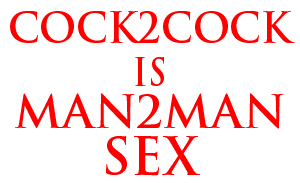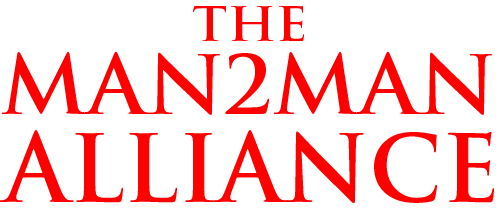





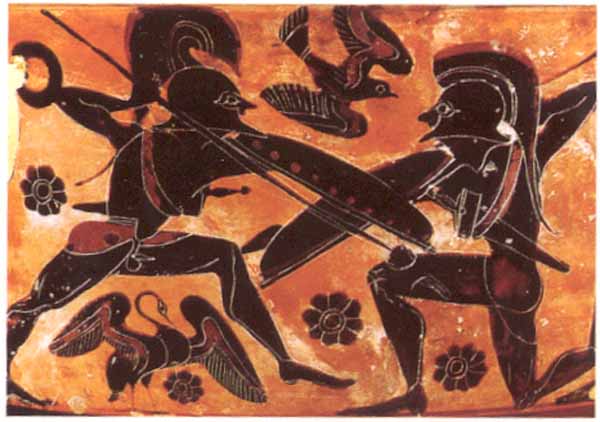
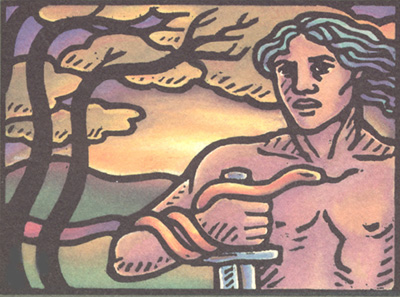


Two Spearmen
9-9-2009
Hi guys.
This is a long post.
For ease of reading, I've divided the post into several parts:
The Preface, and Part I, have now been posted.
Part II has not yet been posted.
I'll let you know when it is.
But I encourage you to start reading today -- by reading first the Preface --
and then Part I.
Bill
This is a post about Morality and Sexuality.
Two areas of human thought and action which the religious right believes should be joined repressively at their heterosexualized hip --
joined in a manner which completely and definitively excludes any expression of male-male eros or love;
and which the secular left believes should have no relationship to or contact with each other -- whatsoever.
Yet our work on this site and in our Man2Man Alliance is about both:
We celebrate and extol both male-male sexuality -- and morality;
and the relationship between them.
That, I've always thought, was clear from the content of our Alliance sites.
Nevertheless, I get letters -- emails actually -- which tell me that many guys -- some of them in the Alliance, some of them not -- really don't understand our work.
And that's because they see it through the distorting prism of heterosexualization and its categories of sexual orientation;
and through heterosexualization's various isms: analism and pansexualism and heterosexism and of course genderism and gender feminism --
while lacking any understanding of the historic reality of Men Loving Men.
That reality was above all a Moral reality.
A Virtuous reality.
A reality which encompassed what we may accurately term both a Moral Masculinity and a Virtuous Virility.
Cross-culturally and historically.
Whether one looks at the Lakota Sioux or the Dorian -- Spartan -- Greeks -- Moral Masculinity and Virtuous Virility are what one sees.
While it is the contemporary mis-understanding and indeed lack of a Moral and Virtuous sense in what we may call the sexual and affectional realm which is so destructive of the lives of Men today.
For example, and without question, one of the central moral issues of our time is the way gay-identified men went on infecting other
gay-identified men with HIV -- even after HIV had been discovered and
anal penetration identified as the principal and primary vector for its dessemination among those men.
That was in 1984.
What I've always known, and what was brought out very forcefully last summer -- that is, the summer of 2008 -- is that males went on infecting males with great gusto -- despite that knowledge.
And that behavior continues to this day.
As a recent study (Sullivan PS et al. Estimating the proportion of HIV transmissions from main sex partners among men who have sex with men in five US cities. AIDS 23, 2009) reported by Aidsmap makes clear.
Here are some highlights from that report:
So -- what have we got?
Twenty-five years after HIV was identified as the pathogen and anal as the vector, the majority of new HIV infections in the US are STILL among gay-identified males.
The rate of new infection in that group has, seemingly, increased since 2000.
And it was already high -- and had been high since at least 1993.
How many guys per day get infected?
The most conservative estimate is 73.
Each and every day.
It's probably more like 80 or 90.
But even 73 is a lot.
That's about three per hour.
One guy every twenty minutes.
Infected with a pathogen which is TOTALLY avoidable.
And remember that prior to last August, we were told that it was a "mere" 40 per day.
The figure keeps going up.
Who's infecting these guys?
Their "main partners" -- their "lovers."
You know, I get an email every now and then asserting that anal's okay so long as it's part of a "loving relationship."
What part of a "loving relationship" involves fucking your "lover" up the butt, damaging his anal sphincter, destroying the delicate lining of his anus and rectum, creating fissures and other tears, getting his shit on your dick, dumping whatever's on and in your dick into his bloodstream, risking perforation of his large intestine, and infecting him with HIV, hepatitis C, and HPV?
And other pathogens.
Doesn't sound "loving" to me.
But then, I'm old-fashioned.
I don't think inflicting disease and death on your lover is a loving act.
Nor do I think that feces should be an integral part of sex.
Yet that's what's happening.
Am I exaggerating about that?
No.
Remember the words of openly-gay ano-rectal surgeon Dr Stephen Goldstone:
Anal sex [sic] is the highest risk sex act two men can perform -- and not just because of HIV. Most sexually transmitted diseases (STDS) can pass between partners during close skin-to-skin contact when a penis rubs against your anus -- and vice versa. Infections travel both ways.
...
News flash: an anus is not a vagina. Your anus is only 1 to 2 inches long and connects to the rest of your colon. The colon's main function is to absorb water from the liquid waste that leaves your small intestines so that by the time it reaches your anus it is solid material.... It is this heightened absorptive capacity that makes your rectum so good at trapping STDs.
...
The anus has two sphincter muscles, the internal sphincter and external sphincter, which control your bowel movements. These muscles are bands that surround your anus and rectum. Your internal sphincter is actually a part of the colon wall and is an involuntary muscle -- which means you can't control it. This is the sphincter that relaxes to let out your bowel movements and gas. Your external sphincter is under the skin of your anus and is a voluntary muscle. You tighten it to keep from having a bowel movement at inopportune times. It also contracts reflexively (and out of your control) when something approaches your anus from the outside. Therefore, no matter how much you want your partner inside you, your muscle will contract to keep him out. ...
Another important difference between a vagina and an anus (or "mangina" as some men like to call it) is that it will not self-lubricate; you need to use a water-soluble lubricant (no Crisco, please!). In addition to damaging condoms, oil-based lubricants can block your anal glands and cause infection. Many oils, including hand creams, also contain perfumes which can irritate your skin and cause dermatitis.
Technique
Sex between men; sex between women and men: Because of the high risk of passing STDs during anal sex and foreplay, place a condom on your partner as soon as his penis is going to come in close contact with your anal area -- even if he isn't going to penetrate you. Put a lot of lubricant on your partner's condom-covered penis and on the outside of your anus. Beware of the "two finger stretch" to get ready for him because this can tear your sphincter muscles easier than his penis. ...As soon as the head of his penis pushes against your anus, the internal and external sphincter muscles contract. You will feel a sharp pain. Stay there! ... Do not stimulate your penis while you are trying to take your partner. This also sets up a strong reflex that contracts your sphincter muscles even tighter.
...
Hygiene
No matter how hard you try, your anus will always be an anus. You can't sterilize it. You can, however, gently wash the outer skin with a moist cloth or pad (try Tucks) to remove any fecal residue stuck to your skin. Avoid wet toilet paper or tissues because they flake and leave behind annoying bits of paper. If necessary, try to move your bowels prior to sex. I do not advise enemas or douching, which may increase the risk of HIV transmission. Enemas -- even if they are just plain water -- irritate the lining of your colon and make it easier for HIV to get in or out. The motion of the sex toy, your partner's hand or penis also stimulates colon contractions. Frequently you won't evacuate the entire liquid enema before sex, and the remainder is forced out during sex by increased colon contractions, making a bigger mess than the one you took the enema to avoid.
...
Complications
Bleeding: most often from a hemorrhoid of fissure (tear). If you see blood, stop. Most often the bleeding stops quickly. Do not have anal sex again until you stop bleeding with bowel movements. If you have hemorrhoids, experiment with different positions to see if you can tolerate one better than the other. Many men find that when the receptive partner is on his stomach, his hemorrhoids experience less swelling and bleeding.
Pain: Pain during anal sex most often results from your sphincter muscles going into spasm or from a tear. You can tear the sphincters or your delicate anal lining (a fissure). If it hurts, stop anal sex. Try treating your fissure conservatively with stool softeners, sitz baths (warm soaks) and hold off having sex until you are healed. STDs can often be present with pain in your anal area but the pain usually doesn't begin until several days after sex. Pain that begins during or immediately after sex usually results from a fissure or sphincter injury.
Perforation: A true tear through your colon wall is a very rare complication of anal sex. A penis is pliable and does not have the strength to rupture your colon. A toy, on the other hand, can cause serious damage - especially if it is long. Your colon makes a sharp bend to the left, approximately eight inches up. A penis can bang against this turn and you might notice a sharp pain in the pit of your stomach. It usually won't push through. A hard toy can push through and when it does, you are in a life and death situation. You feel intense pain and must get right to a hospital. Delay and the bacteria can spread throughout your abdomen. This type of infection (peritonitis) can take your life.
Incontinence: Incontinence is an inability to control your bowels or gas. If your anal sex is pain free, your muscles should be fine and you don't have to worry about this dreaded complication. Those who enjoy fisting or large toys can permanently overstretch their sphincters and are at increased risk for incontinence in later life.
STDs: Anal sex is the highest risk sex act that men who have sex with men can perform. Virtually every STD can pass between partners during anal sex, and for most, penetration isn't necessary and a condom may not protect you. STDs are harder to diagnose when they are inside your anal canal and not on your penis. STDs commonly passed during anal sex include: HIV, herpes simplex, gonorrhea, syphilis, molluscum contagiosum, crabs, human papillomavirus (HPV), hepatitis, and chlamydia. MEN: Put a condom on early -- as soon as you anticipate contact between the anus and penis. Remember that fingers and toys used during foreplay can also carry STDs between partners. A condom doesn't cover the base of your partner's shaft, his scrotum or pubic hair -- these are all places where STDs can lurk or land.
HIV Risk
Anal sex is the highest risk sex act two men can perform.
This is also true for a woman if she's the anal receptive partner with a man. Your risk increases dramatically in proportion to the number or partners you have and if your sex is unprotected (whether you are inserting or receiving). One medical study published in 1987 found that anal sex with one partner increased your chances of catching HIV by three times -- five or more partners increased it 18 times.
[emphases mine]
So -- I'm not exaggerating.
Anal penetration is dangerous and destructive and potentially deadly -- in a number of ways.
And "dangerous, destructive, and deadly" are not attributes we ordinarily associate with a "loving act."
In the study reported by Aidsmap, moreover, the danger, destruction, and deadly disease are being conveyed by "main partners" -- that is, "lovers."
"Main partners" are infecting their "main partners" -- "lovers" are infecting their "lovers" -- with HIV.
How are the "partners" who are doing the infecting -- themselves getting infected?
Through "casual" sex.
You know, the "committed-but-play," always ready to "hook-up" kind of sex.
Of course, "sex" is what the researchers call it.
It's not really sex.
It's anal penetration.
These males are being infected through acts of anal penetration.
How frequent are those acts?
175,000 acts of "casual" "sex" -- that is, "casual" anal penetration -- per year.
That's a lot.
From among just 3652 males --
175,000 acts of infidelity.
175,000 acts of anal penetration.
That's a lot.
A lot of infidelity.
A lot of anal penetration.
That's why and how those gay-identified males are getting infected.
Through many many acts of infidelity and anal penetration.
That is, through many many dishonorable and shameful acts.
IMMORAL acts.
And having become infected through infidelity and anal, they then commit the ultimate act of betrayal and convey the ultimate defeat -- by INFECTING their own "lovers."
Isn't that fabulous?
Isn't that just great?
Doesn't it make you want to get out there and sing that you're proud to be gay?
Yet that's what happens when a culture and subculture denigrate Masculinity and divorce sexuality from Morality.
So -- we need Morality in our discussion of sexuality.
We have to have that.
Because absent any discussion of morality, absent a moral sense to our
thinking about sex, absent a moral *purpose* to sex -- what we get is
very bad behavior -- indeed.
Now: Is this bad and immoral behavior in some way intrinsic to "men who have sex with men?"
No.
You didn't see such behavior among the ancient Greeks.
And that's because their culture -- their CULTURE -- didn't support it.
And I cannot emphasize that enough.
It would be unimaginable, to an ancient Greek, for a Man to damage his Lover -- in a way that is a routine and de facto accepted part of society today.
So this is a question of *culture* -- and morality.
Which goes beyond HIV.
For example, the credit crisis, which has caused such terrible pain, and which may yet destroy us all -- was brought about by immoral behavior
underwritten by a *culture* of greed.
That's the truth.
Analism too is a culture -- a dominant culture -- of selfishness and greed.
Selfishness, greed, and, as was recently pointed out by Warrior John in his post titled pure, masculine, egalitarian, exploitation.
Analism, like the larger culture it inhabits, is a culture of selfishness, greed, and exploitation.
So culture -- and the morality put forth by culture -- matter.
In mainstream American culture, discussions of morality have tended for many years now to be dominated by the so-called religious right.
But that the religious right -- which has been so noisy -- drew the wrong conclusions from the Bible and from everything else -- doesn't mean
that we have to stop thinking and acting ethically.
The Greeks didn't.
The Greeks had their own sacred texts and priests and theologians and philosophers -- who were primarily what we would call ethicists.
And the conclusions they drew -- were the right ones.
Of course, sometimes our religious leaders get it right too.
This is from an op-ed about the financial crisis which appeared in the London Times.
It was written by the chief rabbi of the UK, a guy named Sacks.
Markets need morals, and morals are not made by markets.
They are made by schools, the media, custom, tradition, religious
leaders, moral role models and the influence of people. But when
religion loses its voice and the media worship success, when right
and wrong become relativised and morality is condemned as
'judgmental', when people lose all sense of honour and shame and
there is nothing they won't do if they can get away with it, no
regulation will save us. People will outwit the regulators, as they
did by the securitisation of risk so no one knew who owed what to
whom.
[emphasis mine]
Now -- the rabbi says that "the media worship success," but in reality it's the people -- you -- who worship success.
Which is measured by money.
If the people weren't fascinated by money and success and celebrity, the media wouldn't push it because there'd be no market for it.
So I'd change Rabbi Sacks' statement in just this one word:
And he's correct.
What's more, although the rabbi, in this instance, is talking about markets, you can plug his statement into HIV, the condom code, and the behavior of gay-identified men under analism and pansexualism:
"when right and wrong become relativised and morality is condemned as
'judgmental', when people lose all sense of honour and shame and
there is nothing they won't do if they can get away with it, no
regulation will save us."
That's correct.
What happened in the "gay male community" was that "right and wrong became relativised and morality was condemned as 'judgmental.' "
Just as we of the Alliance are condemned as 'judgmental.'
And not only did people "lose all sense of honour and shame" --
but they were TOLD that they SHOULD "lose all sense of honour and shame."
That's what happened:
Morality was condemned as 'judgmental'; and people were *instructed* to "lose all sense of honour and shame":
because, they were told, concepts such as honor and shame and morality were, in the sexual arena, not just out of date, but destructive.
In no small part because, they were also told, such concepts were the products of "patriarchal" and "masculinist" thinking.
What was put in place of morality, honor, and shame was a slogan -- "it's all sex and it's all good";
and, in the case of AIDS, a regulation -- the so-called condom code:
Use a condom every time, every time.
Don't rely upon -- or trust -- your partner to protect you.
It's your responsibility to protect yourself.
If your partner has HIV and doesn't tell you, and you get infected -- it's your fault -- because you didn't use a condom.
That's the condom code.
And the problem with the condom code, as Rabbi Sacks would, I think, agree, is that it seeks to be what I call a "technocratic" solution -- and what he calls a "regulation" -- to what in fact is a MORAL problem.
The result?
Rather than making the person who knows he's positive or has reason to believe, because of his behavior, that he might be positive, rather than making that person *morally* responsible for infecting others --
it relieves him of any and all responsibility.
That's why we now have 600,000 gay-identified males in the US alone "living" with HIV.
Because we gave those who did the infecting -- a free pass.
Remember what Rabbi Sacks said:
when right and wrong become relativised and morality is condemned as
'judgmental', when people lose all sense of honour and shame and
there is nothing they won't do if they can get away with it, no
regulation will save us.
Yet the idea that you can dispense with Morality, indeed not just dispense with it, but condemn it as judgemental, and then simply "regulate" the problem -- remains the dominant thinking about HIV prevention to this day.
Here's the conclusion of the Aidsmap study we just looked at:
Look at all the technocratic jargon which is used to obscure the fact of the immoral, shameful, and dishonorable behavior which is the cause of the problem:
"prevention interventions"
"men who have sex with men"
"current behavioral risk patterns"
"transmission characteristics"
"Our data suggest that the development and testing of HIV prevention interventions for MSM couples, a historically understudied area of HIV prevention, may be important as we approach the fourth decade of the US HIV epidemic."
"may be important"
The researchers have just demonstrated, through peer-reviewed research, that a lot of males are getting infected by their partners during anal penetration.
Sounds important to me.
Sounds like something which needs to be addressed.
"as we approach the fourth decade of the US HIV epidemic"
Fourth decade?
It'll be thirty years in 2011.
That's a long time.
But the researchers want to do *more* studies.
This time in "the development and testing of HIV prevention interventions for MSM couples."
Why?
And what incredible bullshit.
The solution is clear -- DON'T DO ANAL, and don't sleep around.
You have a lover -- be true to your lover.
Don't do things which will damage your lover -- who is, after all, a fellow human being -- physically and emotionally.
And you know, although Aidsmap and the AIDS establishment gave this particular study a lot of play, it's NOT new information.
We've known for years that "lovers" aka "main partners" infect their "main partners."
Indeed, at the very beginning of the epidemic, there was an article in the Village Voice by Richard Goldstein in which he quoted a man afflicted with HIV who said, with qreat anguish,
That's why, in my initial email interactions with Yury, and as I detailed in my reply to Yury's The Trap of Anti-Masculinity, I talked about how common it is for guys to get infected by their so-called lovers:
Had you not found the Alliance, [Yury,] that acculturation process [into anal and analism] would have gone forward -- and I can say, with a fair degree of certainty, that you would now be HIV+ and infected with hepatitis C and probably a number of other pathogens.
Why am I certain of that?
Because you're vulnerable -- in the sense that you develop crushes -- and you were hanging with gay-identified young people who were into
anal and homeless; and you were also apparently encountering drug
dealers as part of that milieu.
Obviously, gay-identified kids who are doing anal and drugs -- and are homeless to boot -- are at tremendous risk for HIV and all the other anally-vectored diseases.
Diseases I talk about in my reply to Joe's post You people are changing lives.
And of course in an anus is not a vagina
There are a lot of diseases.
This is what would have happened to you:
And let's forget the guy who you had the crush on and who robbed you.
Let's forget him for the moment.
We'll invent someone, we'll call him Robert, he's a little older than you, a tad bigger and more muscular, and he's another gay-identified young guy, who's been homeless off and on, he's now sharing an apartment with a guy who deals occasionally or more than occasionally, and you meet Robert and you develop a crush.
Robert sees that, and he starts having sex with you.
He expects you to bottom and you do.
But you want to be "safe," so you make him use condoms.
And he goes along with that for a while.
Because that's what guys like Robert do.
And after a couple weeks or a couple months, he says to you one night, Yury I really love you and I want to be close to you --
and you say Sure.
So he fucks you without a condom.
Maybe he fucks you for a couple weeks without condoms.
And then he leaves you.
Because that's what happens.
It's a common scenario.
A guy like you -- very often -- gets infected not through promiscuous sex, but through sex with a partner who you thought really loved you.
But he didn't love you -- he was just using you.
And once he's gotten sexually from you what he wants -- he's outta there.
But you've got HIV and hep C.
And he no doubt convinced you to do oral-anal too, so that you've got -- giardia, for example.
Or maybe meningitis.
And maybe you live and maybe you don't.
Robert doesn't care.
I care.
Robert doesn't.
That's what would have happened to you Yury, if you hadn't found our sites.
Was I or am I exaggerating?
NO!
Look at the Aidsmap report.
And please note that the Aidsmap article is dated May 12, 2009.
I posted my reply to Yury on February 25, 2009.
Oh yeah.
This is something I've LONG known.
But it's not just me.
In point of fact, *anyone* who's been part of the so-called gay community at any point since 1981 knows it:
Guys routinely and commonly get infected by their own "lovers."
That's what happens.
It's gone on for years.
And in that sense, it's not news.
The statistics developed by the researchers may be new -- but the reality the study is reporting on is one the gay community has known about and known about well -- since the appearance of AIDS in 1981.
So: Despite all the hate mail I receive and all the slanderous hate-Weintraub-propaganda out there on the net -- I'm telling the truth:
Aidsmap:
"The majority of HIV transmissions (68%) were estimated to be from main partners, with 32% thought to be from casual partners."
Oh.
I guess Weintraub's right about that one.
Yes -- I'm right about it.
Just as I'm right about the huge and exigent danger presented by anal:
"[among gay-identified men,] receptive anal intercourse was the main (69%) mode of HIV transmission ... [researchers] attributed 28% of infections to insertive anal sex and 3% to oral sex"
Among the 3,652 gay-identified males studied, ninety-seven percent of the infections were due to anal penetration.
Three percent to oral.
NONE to Frot.
I'm right about that too.
And more than right therefore to caution guys about what goes down in analist "relationships."
And, you know, it's not just HIV.
Another recent article on Aidsmap looked at an outbreak of syphilis among gay-identified males in the UK:
Over the last ten years, 73% (9560) of all syphilis cases involved gay men. The HPA [Health Protection Agency] report notes that "the characteristics of these patients have changed little over the course of the epidemic." Around a third of patients are aged between their mid 30s and mid 40s, 90% are white, and a third are also infected with HIV. The infection is thought to have been contracted through oral sex in a third of cases.
Right.
Two-thirds are infected through anal; one-third through oral.
The article continues:
Contract tracing has traditionally been an important component of syphilis control, but the HPA notes that 56% of cases involving gay men were reported to have been acquired from casual partners, making this strategy impractical.
Oh.
So that's what the researchers mean by "casual."
So "casual" that the males getting infected through anal and oral "sex" don't even know the NAME of the guy who infects them.
I wonder if they even remember his face -- or even, in many cases, ever saw it.
Getting fucked from behind in a backroom or at a rave -- you need have no contact, other than shitty dick in shitty butthole, with your "casual" "partner."
Remember what Rabbi Sacks said:
when right and wrong become relativised and morality is condemned as
'judgmental', when people lose all sense of honour and shame and
there is nothing they won't do if they can get away with it, no
regulation will save us.
"when people lose all sense of honor and shame"
Most people think it's dreadful of me to talk about "honor."
And "shame."
I get yelled at all the time for using those words -- particularly in a sexual context.
But, as George Orwell says, the evidence is "in front of one's nose":
You take honor out of sex, and what you get is a man-made disaster like HIV / AIDS.
You take shame away from anal penetration -- and what you get is the man-made disaster known as HIV / AIDS.
That's what happens.
And there are many other disasters -- not just physical, but pyschological and spiritual as well.
In point of fact, if we wish to be saved from those disasters, there's no substitute, in this area of our lives, for morality and moral judgments.
I repeat:
In point of fact, in this area of our lives, there's no substitute for morality and moral judgments.
None whatsoever.
But -- they have to be the RIGHT judgments.
They have to be correct.
I said that the religious right has been noisy and wrong.
And when we think of the religious right, it's primarily of the Protestant, exclusive-evangelical, right.
Which is not subtle, to put it mildly; and which in the US, revels in its folksy and down-home style.
But there's also the Catholic right.
The Catholic right is different.
It disdains the crudities of the evangelical right, and instead shrouds itself in the veils of intellectualism and reason.
Recently a colleague sent me these paragraphs from a rightwing Catholic blogger:
The beauty and wisdom of the Church is it penetrates the deepest levels of consciousness and therefore offers a solution which is authentic. As it does, it reveals the sophistry of other supposed solutions. Deceit leads to death-in this very sad epoch of human history, death by condom.
Is there any truth to what the blogger has said?
Let's de-construct those paragraphs and see.
Bill Weintraub agrees -- condoms are a mechanical, or in my words, technocratic, solution to a value-based moral and behavioral problem.
Uh, yeah.
Except that it was never the intention of condom campaigners -- those pushing condoms as a solution to the HIV crisis -- to change *primary* behavior or social norms.
To the contrary.
The whole idea of condom promotion was that it obviated forcing people to make morally-based changes to their behavior.
Hm.
Second use of the word "penetrate" in just two sentences.
But more to the point, what beauty and what wisdom?
I've never seen anything either beautiful or wise in the Catholic Church.
And in what way "authentic"?
The RC Church is one of the least authentic institutions on earth.
Not least in the way it uses the energy of its "gay" clergy to run its programs and preach its ideologies; and of course tolerates not only those guys -- so long as they're closeted -- but pedophiles, etc as well.
When those people are exposed, the hierarchy is always shocked, shocked.
But remember that the Church is, in theory, at least, a meritocracy.
Everyone starts as a lowly priest or brother, and rises from there.
Which means that the hierarchy is every bit as "gay" as the men they condemn.
And while we're talking about beauty, wisdom, and authenticity, what about money?
The aptly named princes of the Church live in palaces.
Not in the sort of hovels that Jesus and his disciples would have inhabited.
No.
In terms of beauty, wisdom, and authenticity, the Church just doesn't cut it.
Which is why the Church has never succeeded in "penetrating" my consciousness.
It's hypocritical, ugly, and stupid.
Not authentic in any way.
Except that its solution is NOT authentic.
Its solution for "men who have sex with" -- is that they stop having sex with men.
That's the Church's "solution."
A "solution" which denies Men an essential aspect of their Masculinity and Manhood.
Our solution is to tell Men that there's another way they can have sex with Men -- a way that's truly authentic, because it's mutually phallic, and thus exalts their mutual Manhood.
Which is what sex between two loving Men SHOULD do.
The blogger claims that any solution other than the Church's -- including therefore our own -- is "sophistry."
But what we're talking about isn't sophistry.
It comes rather out of the life EXPERIENCES of literally hundreds of thousands of MEN who've LIVED through the HIV and AIDS eras while having sex with other Men.
That's not sophistry -- it's reality.
The Church's position, by contrast -- IS sophistry.
It claims that "homosexuality" -- which doesn't exist -- is "disordered" -- whatever that means -- and that all Men who engage in "homosexuality" will go to "Hell" -- wherever and whatever that is.
In point of fact, the Church does NOT know what will happen to you, or Pope Benedict, or anyone else, after they die.
It doesn't.
And neither do you.
And to claim that you -- or the Church -- does -- is sophistry.
Rhetoric.
And that's all it is.
What we say by contrast is grounded in reality and personal experience.
Now -- some of us -- most especially Warrior Robert Loring -- do talk of Hell.
But that's the Hell which Men experience in this life when they deny their own vital same-sex needs and desires.
When they deny their own, organic, and innate Natural Masculinity.
The Hell which Men inhabit who are, as Robert says, "defeated in their own minds" by the anti-Man forces of society -- such as the Church.
Men do indeed go to Hell -- but their Hell is in *this* life, and they end up there because of the preaching of institutions like the Catholic Church.
"Deceit leads to death"
Sure.
But the Church is a leading practitioner of that deceit.
It works to deceive Men about their nature.
While lying about its own nature.
Guys, there are priests, Catholic priests, priests with congregations, who visit this site.
Who actively have sex with other Men.
And who tell their parishoners -- NOT to.
They tell them it's a sin.
Even as they do it themselves.
That's deceit.
And it's disgusting.
"Deceit leads to death-in this very sad epoch of human history"
Is this a sad epoch in human history?
It's sad for Men -- because of shit-heads like this Catholic blogger, who seek to destroy Masculinity.
But of course that's not the reason the Church thinks this is a sad epoch.
The Church thinks this is a sad epoch because in the West, and in particular in the EU, people have turned away from the Church.
Why?
Because for those people, this is not a sad epoch.
They have material prosperity, and, in the EU, a social safety net which protects them and gives them, not least by any means, universal access to health care.
A healthcare which has become increasingly sophisticated at easing human pain.
Their lives are good enough, in other words, in this world --
that they needn't worry so much about the next world.
And the Church has suffered as a result.
As human suffering decreases, the suffering of the Church increases.
Which tells you a lot about the Church.
It's a neat turn of phrase, but it's not accurate.
What's going on is not so much death by condom as it is HIV infection due to "condom campaigns."
Condom campaigns tell guys to "use a condom every time, every time."
But what studies have shown, and what we've discussed ad nauseum on this site, is that slippage + breakage + inconsistent use + incorrect use + disinhibition = MSM HIV infection.
Let's go through those one-by-one:
So -- it's not so much "death by condom" -- which misleadingly suggests that any time you use a condom it'll fail and you'll die --
as it is the incessantly parroted instruction -- or regulation -- to use a condom every time every time, a regulation which, as I said, seeks to obviate morally-based primary behavior and cultural change, change which would actually stop the epidemic.
And save human lives.
Without denying the Men living those lives their God-given right to live fully and completely as Men.
So: just those two little paragraphs from the Catholic right contain a world of lies.
Nicely packaged, but lies and deceit nevertheless.
Of course we've talked about the Catholic right and it's brand of deceit before, most notably in the post titled sex, lies, and the catholic right.
And it's a post I strongly encourage you to read and/or re-read.
In that post, we learned about a blogger we called "commited [sic] Catholic," and his many lies.
This particular deceiver claims to be "same-sex attracted"; and then uses that claim to preach an anti-same-sex love message.
He's bright, and very nasty.
And his work, as is so often the case with these people, is probably underwritten by the Church.
Having found our sites, he wrote to me, and gave me the standard hardline Catholic pitch:
Nevermind that Frot isn't masturbation.
We get his drift -- if it isn't hetero-reproductive, it'll take you straight to hell.
But this is the part I love -- his admonishment that we look
"Humane."
Don't you just love that?
As we just discussed, their idea of humane is to consign Men who Love Men -- to Hell.
Literally.
That's where you go.
And in this life, when the Church has had the power, it's introduced
them to that Hell by burning them at the stake.
That's their idea of humane.
When it comes to "love and affection and the place of sexual desire in
flourishing" the Greeks were infinitely more -- humane.
If one can bear using that word after a creep like "commited Catholic "-- who spends his life in dread of his own normal and natural same-sex
feelings -- has used it.
He also claims that the Church's "humane" approach was the result of Christian authors "synthesizing" Greek ideas.
Well, I guess "synthesize" is one way to put the banning and killing of Greek -- actually Hellenist -- teachers and writers by Roman Catholic emperors like Theodosius and the bending out of recognizable shape of Hellenistic philosophy and ethics.
Which is what the Church did.
That was particularly true in the realm of Manly Love -- but it was by no means the only area.
As Gibbon puts it
~Gibbon, Decline and Fall of the Roman Empire (XXVIII)
Hmmm.
"The ruin of Paganism" -- that is, Hellenism, was, says Gibbon -- "a total extirpation" of a *popular* -- note the word "popular" -- "superstition" -- that is, a religious belief-system;
and as such, he says -- and remember that he's writing in 1776 -- was "a singular event in the history of the human mind."
A singular event in the history of the human mind.
That's how radical and far-reaching was this "total extirpation."
And of course it wasn't only the temples and Hellenistic thought which were, in Gibbon's word, "extirpated."
It was also the great religious-athletic festivals, which had been celebrated for more than a thousand years, in which Men came together to exalt their Manhood through the strenuous physical struggle of one Man, naked and unfettered, against another:
a glorification and hallowing of the Male's inherent aggression and attraction towards other Males --
-- which had its roots in the palaistrai found in every Greek town.
That's what was destroyed.
To say that that destruction was the result of a "synthesis" of Greek thought by Christians, is -- bizarre!
It would mean, for example, that the Hellenist dictum that the Love of Man for Man is more faithful than that of Man for Woman -- which is stated plainly in Plato and other Hellenist writers -- could somehow have been "synthesized" into the notion that such a Faithful love was damnable and subject only to condemnation.
It would mean also that the yearning for moral beauty and moral heroism -- which the ancients believed lay at the heart of the Love of Man for Man -- and which they said would be discovered through a Strife of Valour -- was also deserving of damnation and condemnation.
It would mean that the Love of Achilles for Patroclus -- which, according to both Pindar and Plato, had earned both Heroes an immortal place on the Isles of the Blest -- was damnable.
It would render meaningless and false this sort of Hellenist thinking, given voice by the character named Pausanias in Plato's Symposium:
...
To do the thing basely is to gratify a wicked man in a wicked manner; 'nobly' means having to do with a good man in a noble manner.
"wicked" here of course means anal.
And the speaker goes on to link what we would call analism with promiscuity:
~Symposium, trans by Lamb
The Catholic view would mean that Plato was wrong, and that no matter how Good, Noble, Right, and indeed Abiding, the doing of a thing -- in this case, the Loving of one Man by Another -- might be, it would still be wicked, and still subject to condemnation and damnation.
THERE IS NO WAY THE CATHOLIC VIEW CAN BE SAID TO BE A SYNTHESIS OF HELLENIST OR ANCIENT GREEK THOUGHT.
RATHER, IT IS A PERVERSION AND BETRAYAL OF THAT THOUGHT.
That's why the Emperor Julian, himself an Hellenist, so disliked and indeed detested the Christians.
That's why he attempted, using law and law alone, to break their hold on the Empire.
And that's why they KILLED him.
So -- there is true morality and false morality.
And the litmus test for Men must be this: does the morality support the Love of Man for Man in its noblest instincts?
Instincts which derive ultimately from Warriordom and the Warrior Altruism which is enshrined at its core.
Such a morality must be Just; it must be Brave; it must be Temperate; and it must be spiritually Wise.
Thus constituting a Virtuous Virility:
So:
In this post, I'll be examining some of the contemporary misperceptions -- which are basically *moral* misperceptions -- about our work and "men who have sex with men" which I've encountered recently.
And I'll look at how they compare to the Heroic, Manly -- and, above all, Virtuous -- past.
In doing that, I'll be citing the writing of a number of ancient authors, including Plato and Xenophon and Pausanias and Pindar -- and Plutarch.
Plutarch.
We've often talked about him.
He was a Greek philosopher, historian, biographer, and, above all, ethicist, who lived from about 45 to 120 AD.
He was also a priest of Apollo at Delphi, which wasn't far from where he lived, served his native city of Chaeronea in various "magestries" -- official posts -- and, according to the Loeb Classical Library, was given a consulship by the Roman emperor Trajan and a procuratorship in Greece by Hadrian.
So he was well-respected by both Greeks and Romans, and was honored for both his literary work and his committment to civic and communal society.
Ian Scott-Kilvert, a classicist who translated some of Plutarch's Parallel Lives, says of Plutarch that
his prime object was at once to cherish and understand the greatness of the past and to re-assert it as a living ideal.
That's my object as well:
to cherish and understand the greatness of the past; and
to re-assert it as a living ideal.
As a *living* ideal on which Men -- and Women -- today can model and so enrich their lives.
Scott-Kilvert also speaks of the "moral grandeur" found in the lives of the Men Plutarch describes.
And he cites Mme Roland's remark that Plutarch's Lives "are the pasturage of noble souls."
"Moral grandeur."
"Noble souls."
In virtually all of the Greek lives Plutarch describes, the Love of Man for Man plays a role, a noble role.
That Love, which is uniquely Masculine, energizes the Men to strive repeatedly for that which is noble and morally grand.
That's what the True Love of Man for Man has done historically and cross-culturally.
And that's what it must do again.
Or it will never again be True Love.
Bill Weintraub
September 5, 2009
© All material Copyright 2009 by Bill Weintraub. All rights reserved.
For ease of reading, I've divided the post into several parts:
Parts I and II have not yet been posted.
I'll let you know when they have.
Bill Weintraub
August 31, 2009
Two Spearmen
Part I: Phallus and Fidelity, or, The Sacred Band
9-9-2009
A few months back, I added some entries to our Alliance Youth page, and because one of the entries referred to meeting guys in gay bars -- which are essentially analist institutions -- among other things, for example, most gay bars distribute condoms -- I put up a cautionary note about making clear to guys, wherever you met them, that you don't and will under no circumstances do anal.
I included as part of that note a Vow of Phallic Fidelity, which I'd worked out in correspondence with Michael Plante, also a member of Alliance Youth.
Here's part of what I said:
Comment from Bill Weintraub
I caution guys that wherever you meet someone, whether it's in a gay bar or online or at a gym -- or even at a dojo/fight school -- which I think is the better place to look -- it's very important to make clear to him that you don't under any circumstances do anal, and that you never will.
And you also have to make clear that any sort of "assplay" is totally and forever out of the question.
Otherwise, many guys will think that they can "bring you around."
So you have to be very clear and very firm.
"I don't do anal; if you're into anal, look elsewhere."
And, of course, you shouldn't be having sex with a guy the first time you meet.
You need to spend time getting to know him -- and to know him well -- before anything sexual happens.
I'm saying this because we know there's a very high rate of date-rape among gay-identified males -- one study found that 33% of gay-identified males had been anally date-raped:
Abstract
Incidents of nonconsensual sexual activity among 930 homosexually active men living in England and Wales are analyzed. Of these men, 27.6% said they had been sexually assaulted or had sex against their will at some point in their lives; one third had been forced into sexual activity (usually anal intercourse) by men with whom they had previously had, or were currently having, consensual sexual activity. The contention that male rape is usually committed by heterosexually identified men, primarily as an expression of power and control, is not supported. Recognition that gay men rape other gay men is needed, both by the gay community and support services for victims.
Key words sexual assault - male rape - gay men - sexual behavior
"The contention that male rape is usually committed by heterosexually identified men, primarily as an expression of power and control, is not supported. Recognition that gay men rape other gay men is needed, both by the gay community and support services for victims."
"gay men rape other gay men"
Gay-identified males are routinely raped by other gay-identified males.
And that's because their culture teaches, "If it isn't anal, it isn't gay."
So you have to be careful about who you open yourself up to sexually.
Particularly when you're young, and inexperienced.
I discussed this with Michael Plante, who's part of Alliance Youth, and he and I came up with an oath or vow.
Which we call The Vow of Phallic Fidelity.
Some of you may think it's hokey;
and some of you may think it's a great idea.
I actually think it's hot.
But its purpose is to make clear to guys who are coming out of analist culture -- that anal is never and can never be on the table.
Nor can infidelity.
Here's the oath, or pledge, or vow:
I today swear with you and to you, and before almighty God, this sacred oath of Phallic Fidelity.
I swear, before almighty God, that I'll always love you -- you and no other Man.
I swear, before almighty God, that I'll always express my love for you phallically -- through the placing of my phallus against yours.
And in no other way.
And I swear that I'll never ask you to express your love in any other way.
That there may always exist between us the highest bond that can exist between two Men:
The Bond of Phallic Fidelity.
Phallus and Fidelity.
Strength and Honor.
And guys, you can have fun with this as well.
For example, there are those who claim that the word "testify" derives from "testicle."
Fine.
You can testify to this oath by holding each other's testicles while you swear your mutual Phallic Fidelity.
So the occasion can be hot -- as well as solemn.
Bill
That's what I said.
And within hours of saying it, I got an email from one of the Alliance Youth guys, complaining about my saying it:
"cult"
"cultish"
When one of our guys directs words like that at me, it not only angers me, and properly so, but it reminds me of just how deeply our guys have bought into their own oppression.
They're so oppressed that they self-oppress.
And if someone dares suggest something NEW that might actually help them -- they start calling names.
But offering guys a tool to help them combat the pressure and coercion to do anal;
and the pressure to be promiscuous --
isn't cultish.
It's what we're supposed to do.
It's part of our mission.
Nor is what what my youthful friend said about the nature of our site and our Alliance correct:
No.
While it's true that we seek to educate and enlighten the public about a sexual act; and that we seek to support Men in their Masculinity --
that's the least of what we do -- at least read in that way.
Because what we're really about is morality and helping Men to make moral judgments and therefore choices in the sexual and affectional realm.
That's what we're about.
Let's begin at the beginning.
This is what I said in the Founder's Message way back in 2000:
Tired of being put down cause you're not into anal?
This is a good place for you to be.
Think that nothing matches the freedom, the equality, the romance and the pure masculine sensuality of two men joined cock to cock balls to balls chest to chest face to face and heart to heart?
This is an even better place for you to be.
Think that there's nothing on this earth more holy than mixing your cum with your lover's or best bud's and feeling the white hot jizz bathe your pecs and your abs and cocks and balls in that pure and purifying male essence?
This is the place for you.
And do you sense or suspect that maybe, just maybe, there's something heroic about your dreams and your life and homosex and that somehow the stuff you like -- the body rubbin, the cockrubbin, the frot, the wrestlin, the fightin -- that maybe all that stuff is tied together?
Then stick around.
So -- from the beginning I talked about Freedom and Equality.
And choosing the Freedom and Equality of Frot over the domination and submission of anal -- is a moral choice.
Whether you understand that or not.
I also talked about the Heroic element in the dreams and lives of Men into Frot --
and, to me, Heroic also implies a moral choice.
And I used the word "Holy" to describe Frot.
And I still do.
And all those words -- Freedom, Equality, Heroic, Holy -- are about moral choices.
They're not about "sex education."
Nor will you find them on ordinary so-called sex education sites such as those run by the AIDS Service Organizations.
Fidelity -- which is another word and imperative we added to the mix not long after the original Founder's Message appeared -- Fidelity too is about moral choice.
Freedom, Equality, Heroism, Sanctity, Fidelity -- and another word we use a lot -- VIRTUE --
These words are about Morality and Moral choices.
Moral judgements.
Which must have, in some measure, a spiritual component.
That's why we speak of Frot as a spiritual act and a Holy Sacrament.
That's why we describe Masculinity as a Divine Principle.
And Manhood as a Divine Gift.
Because clearly if Masculinity is a Divine Principle, it has a moral component.
As does Manhood.
And historically both have been seen that way.
Masculine behavior is Moral behavior.
Virility -- in its actual and true sense -- is Virtuous.
That's why I've been going to such lengths to spell out for you the vital link -- which was at one time taken for granted -- between Masculinity and Virtue.
That's why I devote so much time to talking about the Latin word Virtus and the Greek word Areté.
And the relationship between Ares -- the Warrior God, who, as one writer says, is "the mysterious and divine protector of the Warrior Spirit" -- and Masculine Virtue and Valour.
And that's why in the Vow I proposed, the words Strength and Honor are united to Phallus and Fidelity.
And those in turn to Virility and Virtue, Virtue and Virility.
In short, it's very important that you understand the MORAL basis of this work.
A point I made in my reply to Jason's I'm so grateful this resource is available because it has changed my life -- which talks about how helpful the Alliance has been for him:
The world needs more MORALITY in sex.
That's what it needs.
This site is about morality and making moral judgements in the sexual and affectional realm.
About understanding Love between Men as it was historically understood -- as a force which has a place in the Moral structure of society and the Moral Lives of Men.
Something we discuss most recently in Warrior Chris's Reclaiming Our Nobility As Men.
Ck it out.
And that reply was posted in April -- of 2009 -- only about a month before our erstwhile friend declared that the site was about "sex education" and that any deviance from that was "cultish."
NO.
This work is not just about a sex act or Masculinity, much as we may value both.
It's about moral choices.
And the morality which underlies the sex act we extol -- and Masculinity itself.
So, and again, it's crucial that you understand the MORAL component of this work.
And for those of you who are only here because you want to get laid, let me clue you to something:
You have to understand the morality of the act BEFORE you get laid.
Otherwise, the laying, as it were, may lead to consequences you never anticipated and never wanted.
Just the way it is.
You must be understood and you must understand MORALLY -- before you have sex.
That's why the ancients prescribed such long periods of courtship for their young men.
Of course, to most of you, that was then.
You'd be a lot better off -- if you made it your NOW.
For just that reason, let's take a closer look at the question of a Vow of Phallic Fidelity -- seeing what purpose it might serve in the here and now;
and what its relationship is to the vows taken by ancient Warrior Lovers.
First of all and clearly, there's a double standard here.
When a man and a woman promise -- or vow -- to love, honor, and obey, forsaking all others, etc -- that is, to Love and be Faithful to each other -- it is, according to many preachers and legislators and judges -- the highest and most to-be-protected act in Western civilization.
But if I propose that Two Men vow to Love and be Faithful to each other -- it's a cult.
No.
If the Marriage Vows aren't cultish, neither is the Vow of Phallic Fidelty; particularly given that I'm not ordering anyone to take that vow --
I'm merely offering it as a tool, a means that some Men may wish to use to strengthen their bond with another Man.
Now, it's true that when "hetero" people -- as well as, increasingly, "gay" people -- take what were originally intended to be marriage vows for a mixed gender, male-female, couple -- those vows are just called "The Marriage Vows."
They're not called "The Vows of Penile-Vaginal Fidelity."
In other words, they don't talk about genitalia.
Why not?
Because they don't have to.
They don't explicitly mention penises and vaginas -- because it's not necessary.
Most sex between most men and women not only traditionally, but still today, is genital-genital, penile-vaginal.
And that goes, literally, in the case of the marriage vows, without saying.
But when we, by contrast, talk about Two Men, we're dealing with a subculture which has run way off the rails in terms of genitality -- it's a subculture in which anus and rectum have replaced the male genitals.
(For those who may have forgotten, or been confused by years of analist lies and obfuscation, the male genitals are the Penis and Testicles.
Those are the male genitals.
Nothing else qualifies.
The Penis and Testicles are the male genitals.
Nothing else.)
So naturally we have to talk about Phallus.
And as you'll see, in the ancient world, people discussing Eros -- that is male-male love -- talked about Phallus too.
Obliquely perhaps.
Nevertheless, they talked about Phallus.
And I'll get to that in a bit.
But just sticking with the here and now, I've fashioned for Men, including for you guys, a Vow of Phallic Fidelity -- because it's needed.
And I've managed, in just one brief and felicitous phrase -- "Phallic Fidelity" -- to encapsulate and get across to you and everyone else -- two key ideas:
Phallic Fidelity.
Those Men are making, to themselves, and before the world, and before God, a vow which promises that they'll be Faithful to each other; and Faithful to the core and primal male sexual act which physically expresses the merging of their mutual Manhood.
Phallic Fidelity.
Phallus and Fidelity.
And I twin those last words with these: Strength and Honor.
Phallus is a symbol of Strength; Fidelity is an expression of Honor.
So that Phallic Fidelity expresses both Strength and Honor.
You may not believe in Honor;
or you may not like the association of Masculinity with Strength.
Or of Strength with Fidelity.
In which case, this Vow is not for you.
Nor is this site, to be frank, or this Alliance.
But most of our guys, that is, the True Warriors who make up the core of our Man2Man Alliance -- believe in Phallus and Fidelity -- and in Strength and Honor too.
And The Vow of Phallic Fidelity -- is for them.
As is the linking of Virtue and Virility.
Further, all of you need to understand that when I put forward ideas like Phallic Fidelity or Fidelity Alliance, I'm simply fulfilling the mission of the Alliance.
Which is an advocacy site and organization.
We advocate:
That's our program.
And we put that program in an historical and cross-cultural context, so that Men can understand that those three behaviors we advocate -- Frot, Fidelity, Masculinity -- have been the norm among Men for millenia.
Another way of thinking of us is as what Patrick calls a social ministry.
Social -- not religious.
Ministry -- having a moral purpose.
That means that we put forth, within a secular context, ideas and a program meant to improve society and human life -- in this case, the lives primarily of Men, though what we're talking about impacts Women as well.
And promoting Fidelity and helping Men understand that male-male relationships don't have to and historically have not followed an analist / contemporary pattern is a core part of our program.
So we exist to encourage Men to think morally and critically about their sexual and affectional choices.
Within that context, the idea of "Phallic Fidelity" isn't new.
I often talk about it, and it's had its own page since 2003.
In short it's an idea which I often discuss -- and which has long been present on the site.
Regarding the Vow of Phallic Fidelity, no one's going to be forced to take such a vow.
And like I said, you, dear reader, may not think it personally useful.
But it may be useful for other guys.
Michael for example thinks it's great.
So it's out there as a tool for those guys who want to use it.
And I said so in introducing it:
Some of you may think it's hokey;
and some of you may think it's a great idea.
I actually think it's hot.
But its purpose is to make clear to guys who are coming out of
analist culture -- that anal is never and can never be on the table.
Nor can infidelity.
Again, it's presented as a tool for those guys who want to use it.
The fact of the matter is that our guys experience a lot of pressure
and coercion to do anal.
Which we know not just from what guys tell us, but from the study I
cite on the date-rape page.
And the figure in that study -- of 33 percent -- is very high.
It's significantly higher than I've seen in any study of hetero date-rape.
Which tells you is that when we say there's a lot of pressure and
coercion to do anal -- that's the truth.
Which means that our guys need ways of countering that pressure.
Which means that one of the things the Alliance is expected to do and
does -- is help guys resist that pressure.
Again, it's core to what we do.
Now, about that oath in particular:
What often happens is that a guy goes into a relationship with
the understanding that there won't be any anal.
And then, over time, his partner begins pressuring him to do anal.
And it becomes a big issue.
Some guys go along to get along.
Other guys break up over the issue.
But when that happens -- when anal, which was supposed to be off the
table, becomes an issue -- it's emotionally very debilitating for our
guys.
Am I making that up?
No -- we hear it all the time -- most recently in Jason's I'm so grateful this resource is available because it has changed my life.:
I've been the victim of a good deal of head games. I spent almost
four years in a relationship with someone who I think pretty clearly
resented me for never wanting to have anal. So often I got messages
that not doing anal was not enough, that there was no satisfaction
unless the holy, manmade pinnacle of homosexuality was practiced. "We
don't have sex!! You don't see that as a problem?!" (We don't have ANY
sex??) "You'll like it." (Not likely.) "It'll be so hot once you like
it." (Sure.) So great: there was one point of contention and source of
distress in that relationship, not to mention what a huge weight it
was to always have that expectation hanging over me.
Jason: I've been the victim of head games ... it was a huge weight to
always have that expectation hanging over me.
What Jason describes is real.
And the distress and pain is real.
Fact is, few things are more stressful in life than being in a bad
relationship and/or going through the break-up of a long term
relationship.
That's a huge and major life stress.
So -- the vow is a tool.
It says, in effect: you'll never ask me to do anal.
We'll express our love phallically.
And faithfully.
Which is what our guys want.
Putting the vow on the site is not then, in any way, cultish.
It's giving our guys an option.
Which is exactly and precisely what we're supposed to do.
Now, I said our work -- and in particular our take on Men Loving Men -- has historical antecedents.
That it constitutes a return to the Heroic, Manly, and Virtuous Past.
Am I telling the truth about that?
Yes.
Just the other day I was reading Pindar -- the Greek poet who lived from about 518 to 438 BC; and I came across this "victory chant" or hymn by another Greek poet, Archilochos, to which Pindar was referring:
Hail lord Herakles
~ Translated by Wm Race
Like I say, Pindar mentions those lines, which were extremely popular at religious-athletic festivals such as the Olympics, and which would have been well known to all of Pindar's readers; and he mentions them as a part of his own victory ode or poem or hymn -- meant to be sung aloud --
for a guy named Epharmostos, from the city of Opous, who won the Olympic wrestling competition in 468 BC.
Now, as I also noted, the translation is by Wm Race, and I like Prof Race.
But in this instance, I could see that he was missing the point in what Archilochos had said.
Because he translated the penultimate word of the poem in Greek -- aichmeta -- as "warriors":
Chaire anax Herakleis
autos te kaiolaos
aichmeta duo
Hail lord Herakles
you and Iolaos
warriors both (or) a pair of warriors
Hail lord Herakles
Actually, however, the more usual translation of that next-to-last word -- "aichmeta" -- is "spearmen."
An "aichme" is a spear-point or spear, and an "aichmetes" is a spearman.
Why does that matter?
Because Herakles and Iolaos were lovers.
Male-Male Lovers.
United in Eros -- Eros being both the God of Male-Male Love;
and the word for romantic, sexual, Male-Male Love.
Eros.
Herakles and Iolaos were united in Eros.
And if you refer to them not as Warriors, which they were, but as Spearmen, which is what Archilochos did, what you get is this:
Hail lord Herakles
or
Hail lord Herakles
or
Hail lord Herakles
And what you retain is the phallic imagery in the warrior context -- which Archilochos certainly meant to be there.
There are, after all, other words for warrior, such as "machetes," which don't necessarily mean "spearman."
But the word used by Archilochos is aichmeta -- spearmen.
It's phallic.
Does anyone remember The Spear-Points of Young Men Blossom There?
That was the title of our first Agogé post.
Here's the poem on which it's based:
The spear-points of young men blossom there
That's by Terpander, a Spartan poet, its imagery is clearly phallic, and the word Terpander uses for spear-point is aichma -- which is just the Doric form of aichme -- spear-point.
So Herakles, a great mythic hero, and his beloved, Iolaos, are described as "aichmeta" -- Spearmen.
What does this have to do with our Vow of Phallic Fidelity?
Well, you see, just as the Spartans had a holiday called the Hyakinthia, which celebrated the love of the god Apollo for the Spartan prince Hyakinthos;
so the Thebans had a holiday called the Iolaia -- which celebrated the Love of Herakles, a son of Zeus and the greatest mythic hero, for Iolaos -- a native of Thebes.
I wonder where the Thebans got the idea for their holiday?
From the Spartans maybe?
Yeah, just maybe.
For one thing there was a clan, called the Aigeidai, whose members were prominent in both Thebes and Sparta.
So the two cities, though eventually mortal enemies, were connected by clan and cultural ties.
And they shared, as did many Greek city-states, this basic mythological model or paradigm:
An immortal God Loves a mortal Hero.
Apollo -- who was an immortal God -- loved the Spartan Hyakinthos.
Herakles -- who began life as the half-mortal son of Zeus and then became a God -- loved the Theban Iolaos.
And both Sparta and Thebes had holidays to celebrate those loves: the Spartan Hyakinthia, the Theban Iolaia.
The Theban Iolaia included an athletic competition -- which means there were a lot of boys, youths, and young men, both from the city and who came to the city, competing naked in both fight sports and what we'd call track and field.
And that's not all.
Because Aristotle tells us that at Thebes, male lovers would go to swear devotion to each other at Iolaos' Tomb.
Remember that to the ancients, Men like Hyakinthos and Iolaos were real -- not mythical -- and being real, they had tombs.
Hyakinthos was said to be buried in a very large and very elaborate altar to Apollo, which included an archaic statue of Apollo:
The temple to Apollo which contained this statue, and which we know from both a Spartan coin depicting the statue
and from Pausanias' very elaborate description of the temple complex, was in Amyklai, a Spartan town about three miles south of Sparta proper.
The statue was placed on an elaborate throne, heavily decorated with mythological subjects -- which are only suggested by this artist's reconstruction:
Like I say, this artist's reconstruction only suggests the elaborate carving and statuary groups on the throne.
Pausanias' description of the reliefs and statues on the throne fill a full four pages in his text -- here's a sample:
So there was an elaborately decorated throne, full of gods and goddesses and heroes. But, as you can see, the statue of Apollo was not sitting on the throne; rather it was standing, and was very tall -- at least 45 feet high -- that's more than four stories.
And buried in the base of the statue, Pausanias tells us, was Hyakinthos' body.
~Pausanias, III, 19, 3, trans by Jones.
So Hyakinthos was treated as a Hero, he had a tomb located not just in the temple complex but in the pedestal of an immense statue of his lover, Apollo, and on the holiday, sacrifices were made to him.
And when I say, immense, I do mean immense.
In the artist's reconstruction, which, again, is based on Pausanias's description, you can see there's a set of steps, and at the top of them, two human-sized chairs on the platform the pedestal itself rests on.
This was not a small installation.
It was a huge temple complex, heavily decorated, in honor of Apollo and Hyakinthos.
In honor of Two Males, Two Spearmen, who loved each other.
You need to look at this picture, and let that fact sink in to your brain -- for a good long while.
The Hyakinthia, the Spartan holiday celebrating the Love of Apollo for Hyakinthos, was one of three major Spartan holidays devoted to Apollo, whom the Spartans particulary reverenced because they believed he had given them, via Lycurgus, their system of government, their Eu-nomia or Good Rule.
Interestingly, Xenophon records, in his discussion of how the Spartan King Agesilaus led a typically Spartan life -- that is, a life devoid of luxuries --
and a life very like that of non-royal Spartans --
Xenophon records that during the Hyakinthia, Agesilaus sent his daughter to the festivities in Amyklai, which was about three miles south of Sparta proper, via "public car."
No private chariot for her -- she took the bus, just like everyone else.
And if you didn't want to be known for putting on airs -- you had to use it.
And that's not all.
Because Plutarch tells us that these "public cars" were actually wooden figures of "griffins and goat-stags" on wheels; that these were known as "kannathra"; and that it was in these carved carts that young girls were carried and transported during sacred processions.
These were, in other words, special holiday vehicles.
And what that tells you is how important Amyklai and the Hyakinthia were to the Spartans.
So important that they made sure that everyone could easily get there to observe the holiday -- and in style.
Now, I have to say, sadly, that nothing is left of this statue or its pedestal or the throne which surrounded it.
Nothing.
Not a shard.
Pausanias describes huge numbers of statues and reliefs and paintings too, at the Olympic complex, at Delphi, at Corinth and Athens and Sparta and throughout Greece -- of which almost nothing is left.
The destruction was almost a hundred percent.
And most of the objects destroyed were of either marble or bronze.
So they weren't so easy to destroy.
But they were destroyed.
Of course the wooden carts too have vanished -- the special festival carts in which the women of Spartan rode to the Hyakinthia in Amyklai, and which had been no doubt lovingly preserved for centuries -- they too were destroyed.
Nevertheless, at one time, and for hundreds of years, perhaps a thousand, there existed in a suburb of Sparta called Amyklai, a huge and elaborately carved throne and statue of Apollo, there because a youth named Hyakinthos had been loved emotionally and physically by the God -- and because that Love was deemed worthy of veneration and celebration.
What about Iolaos, beloved of Herakles?
Here's what Pausanias tells us:
In front of the Proitian Gates at Thebes is also Iolaos's Training-Ground and a stadium of banked earth like the ones at Olympia and Epidauros; they point out the divine Hero's shrine there.
~ Pausanias, IX, 23, 1, translated by Levi.
Let's look at that a bit more closely:
The Greek word which Prof Levi has translated as "Training-Ground" is
"gymnasion" -- meaning "Place of Naked Exercise" -- and would have been understood by Pausanias' readers to include a palaistra or Fight School;
The stadium would have been used for running events.
Sparta too, Pausanias tells us, had a "Dromon" or "running course" adjacent to a gymnasion -- so this was probably a common and certainly logical arrangement; and
The divine Hero is of course Iolaos -- it's his shrine.
So there are three elements: the nude training area, the running course, and Iolaos' shrine.
Was there a statue of Herakles in the shrine?
Hard to say.
Pausanias only describes statues when he thinks they have some particular religious or artistic merit.
And, in point of fact, it was common for a palaistra and gymnasion to have not only a Herm or phallic Hermes, as we've often discussed:
A boxer stands victorious in the palestra.
On the left is a herm -- unfortunately, the phallus has been broken off.
The boxer holds a palm branch and a ribbon, both signifying victory, and wears a boxing glove on his left arm.
1st century AD Roman terracotta.
So, and like I said, it was not only common for a palaistra and gymnasion to have a Herm -- a pillar with the head of Hermes and an erection --
but a statue of Herakles as well:
As I explained in A Nation of Heroes:
Herakles was one of the tutelary or guardian gods of palaistrai everywhere, and statues of Herakles were common in Fight and other athletic spaces all over the ancient world, as we can see from this Roman-period terracotta:
Herakles was represented in the Fight Space not only because he was a symbol of strength, but because his fight with the Nemean lion was the mythical model for the pankration:
Remember that people in the ancient world engaged in a process we call "mythic identification" -- they identified with mythic figures and modeled their own lives on those of their mythic heroes.
Pan-kration means "all-powerful"; and Herakles was, as Professor Miller tells us in Ancient Greek Athletics, "the patron deity of pankratiasts."
So -- a palaistra / gymnasion commonly had both a Herm -- a column with the head of Hermes and an erection; and a statue of Herakles.
Sometimes, apparently, the two elements were combined, because Pausanias tells us that at another "naked training ground" or gymnasion he visited in a place called Sikyonia, there was a statue of Herakles "whose lower parts are similar to the square Hermai."
In other words, the statue was phallic and had an erection.
It's important to understand in that regard that depictions of both phalluses and phallic symbols were common throughout Greece and the rest of the ancient world -- both in everyday life, in places like palaistrai, and in other holy spaces and festivals.
For example, Pausanias notes that also in Sikyonia, and also near the training-ground, there grows an herb called "paideros."
Levi translates that as "lad's love" - but it's actually boy love -- paid - eros / boy - love.
And it was worn in thick wreathes by the "phallo-phorai" -- phallus-bearers, guys who carried phalluses in religious processions.
Plus -- the "phorai" in phallophorai has an additional connotation of guardian or protector, so these guys were guardians of the phalloi -- the phalluses.
Phalluses were symbols not only, as Danielou says, of "male creative power," but of the generative, regenerative, and life-giving forces of nature in general.
As such, they were worthy of protection and veneration.
And we need to see how different that is from the way the phallus is regarded in our modern age, in which it's become, as feminists would have it, a symbol of male domination, of male violence, of "phallocracy" and patriarchy.
So -- and getting back to the "Training-Ground" in ancient Thebes -- we don't know if there was a statue of Herakles -- though there almost certainly was -- because such statues were common in palaistrai.
And there would have been a Herm -- as well.
And, at this training-ground, there was a shrine -- says Pausanias -- a shrine to Iolaos.
Was the shrine also a tomb -- as Aristotle says?
Pindar, who lived before Aristotle, says it was.
And, guess what?
Pindar would know, because he was from Thebes.
Oh yeah.
Thebes was his native city.
He may even have been a member of that prominent clan, the Aegeidai, I mentioned earlier -- in which case he had Spartan connections as well.
And Pindar, like Aristotle, says (in the Victory Ode known to us as Olympian 9) that there was a tomb of Iolaos in the area of the stadium -- the stadium used during the Iolaia --
Which Pausanias tells us was connected to a "training-ground" -- a Fight School -- and the stadium, both of which were almost certainly used not just for athletics and athletic festivals, but for military training and drills.
And that's where same-sex lovers went to swear their devotion to each other.
They swore an oath of Fidelity at Iolaos's Shrine which was in Iolaos's Training-Ground -- his Naked Fight School and Military Academy.
Those connections -- between Nude Fighting and Spearmen and same-sex Eros -- were pretty explicit -- weren't they?
As a matter of fact, it's quite possible, based on ancient practice, and knowing Pindar's way of referring to locales, that the wrestling matches and other fight sport competitions at the Iolaia took place in front of Iolaos's tomb.
The stadium of banked earth, as Pausanias says, would have been used for running events, including running with and without armor:
while the area in front of Iolaos's tomb -- would have been where fighting events -- wrestling, boxing, and pankration -- were held:
And you can see very clearly in these pictures the dyadic nature of these events -- the fight sports were one Man's strenuous physical struggle to overcome, to excel against, another Man.
And, once again, that's where, at the site of these Fights, at Iolaos's tomb, same-sex lovers went to swear their devotion to each other.
They swore an oath of Fidelity at Iolaos's Shrine which was in Iolaos's Training-Ground -- his Fight School and Military Academy.
On ground that had been consecrated, quite literally, by the sweat and blood of Fighting Men.
Making the connections -- between Fighting and Spearmen and Competition and same-sex Eros -- very explicit.
Ioloas, we should note, was a hero twice over -- first of all, as Plutarch tells us, as a Warrior who assisted Herakles in his labors; and secondly as a great athlete.
Tellingly, in the Victory Ode known as Isthmian 1, which honors a Theban victor in a chariot race, Pindar compares the victor both to the Theban Warrior and athlete Iolaos; and to the Spartan Warrior and athlete, Kastor, brother to Polydeukes:
...I wish to compare [the victor] to Kastor, or Iolaos,
and in athletic games they took part in the most contests,
and how it shone as they hurled javelins from their hands
the one, Iphikles' son belonging to the race of Spartoi [the Theban ~ translated by Wm Race
So -- while Kastor is a Spartan, Iolaos himself belongs to or is descended from "the race of Spartoi," or sown-men, who rose up out of the earth after Kadmus, the founder of Thebes, killed an enormous dragon, said to be the son of Ares, and planted its teeth.
From these teeth arose, as I said, the Spartoi, the sown-men who were fully armed; and as soon as they'd risen from the earth, they started fighting among themselves.
When only five were left alive, the fighting ceased, and those five became the heads of the first families of Thebes.
In the Theban foundation myth then, the males appear "parthenogenically" -- they're born from dragon seed, without any help from a female.
And since the dragon was Ares' son, the Spartoi are pure descendants of Ares.
So Iolaos is a descendant of Ares, Herakles a son of Zeus.
And for the Thebans, they are the archetypal Two Spearmen.
Was the vow the Two Spearmen swore a vow of Phallic Fidelity?
I don't know.
It may have been a private vow which varied from couple to couple.
Or it may have been -- and most likely was -- a formal ceremony, which included a priest and a sacrifice.
But the point is that it was a vow sworn between two Warriors -- both of whom are identified, by Archilochos, as Spearmen.
So: The poem says
Hail lord Herakles
It doesn't say,
Hail lord Herakles
It doesn't say that.
It describes BOTH as spearmen.
Spearmen.
Spear -- MEN.
Not spear queers;
but SPEAR MEN.
That's what it does.
That's how it describes them.
Not as deviants from their society, but as representatives of its most important class -- the Warrior class, the Spearmen, who defended the city-state and kept it FREE.
And just as there was nothing hokey, nor cultish, about those guys, those Theban Warriors and Spearmen, going to the tomb or shrine of Iolaos to swear eternal devotion --
so is there nothing hokey, nor cultish, about two guys in our contemporary world taking a mutual Vow of Phallic Fidelity.
Nothing hokey, and nothing cultish.
And it's legitimate, and indeed more that legitimate, of me -- to suggest it.
Once again, I'm not ordering or forcing anyone to take that vow.
Not a power I have or wish to have.
I simply suggest that you consider using such an oath, or one of your own devising, to avoid getting into the sorts of messes which Jason suffered through.
Believe me, you don't want to have to go through the loss of a partner -- unless there's no way it can be avoided.
Trust me on that one guys, I have a lot of experience with it.
Oh, by the way, the literary evidence we have for Iolaos and Herakles being lovers comes from Plutarch, writing ca 100 AD.
Isn't it possible he just made it up?
No, actually not, because we also have graphical evidence in the form of works of art.
The most compelling, probably, is this one from the 4th century BC -- that is, about four hundred years BEFORE Plutarch.
It's an Etruscan vase, and it shows Iolaos, EROS, and Herakles.
Once again, this is Iolaos and Herakles, two Spearmen, united by EROS.
Impressive, huh?
What do you think your life would have been like if, instead of or perhaps, in addition to, having pictures of say, Jesus, Joseph, and Mary, in your local church -- you had pictures like this one:
Do you think your life would have been different?
Better?
I assure you that there'll be many such images at New Sparta.
Here's what Plutarch has to say about Warrior-Spearmen in Love:
The legend has it too that Iolaos, who was beloved by Herakles, accompained him during his labors and shared them with him;
and Aristotle says that even down to his own times the tomb of Iolaos was a place where lovers exchanged their vows.
It was natural, therefore, that the Band was termed Sacred for the same reason that Plato describes the lover as a friend 'inspired by God,' and it is said that it was never defeated until the battle of Chaeronea [where the Macedonians defeated the combined armies of the Greek city-states]. The story goes that when king Philip of Macedon was inspecting the dead after the fighting, he stood at the place where the three hundred had faced the long pikes of his phalanx, and lay dead in their armor, their bodies piled one upon the other. He was amazed at the sight, and when he learned this was the band of the lovers and beloved, he wept and exclaimed, 'A curse on those who imagine that these men ever did or suffered anything shameful!'
~Life of Pelopidas, translated by Scott-Kilvert
What did Philip mean by "did or suffered anything shameful"?
He meant played the insertive ["did"] or receptive ["or suffered"] part in anal penetration ["anything shameful"].
That's exactly and precisely what he meant.
As we've discussed, just as the Greek word for human waste / shit -- Kake --was the root of the Greek word for evil, ugliness, and cowardice -- Kakos;
so was shame *directly* associated with anal penetration, as we can read in this fable by the Greek Aesop:
Aesop's Fables, translated by Laura Gibbs (2002)
528. ZEUS AND SHAME
Perry 109 (Chambry 118 *)
After he had created people, Zeus immediately implanted in them all the possible human character traits, but he forgot about Shame. Since he didn't know how to get Shame inside the human body, he ordered her to go in from behind. At first Shame protested, considering Zeus's request to be beneath her dignity. When Zeus kept insisting, she said, 'All right, I will go in there, on the condition that if anything comes in there after me, I will leave immediately.' As a result, people who engage in sodomy have no sense of shame.
Aesop: "People who engage in sodomy [anal penetration] have no sense of shame."
Philip: 'A curse on those who imagine that these men ever did or suffered anything shameful!'
Shame.
Shameful.
Philip, who as an adult had many same-sex love affairs, had been, as a youth, held hostage at Thebes -- he knew what he was saying.
He knew that at Thebes, as throughout the Greek world, anal penetration was shameful and forbidden.
And that the Thebans didn't practice it.
He knew that in those Warrior unions there were TWO Spearmen -- not one.
And he made a point of honoring those brave Men who'd fought against him at Chaeronea -- by saying so.
These are Spearmen:
You'll notice that they always face their opponent, their antagonist.
Even when, as on the right, a man has fallen, he continues to face his opponent.
He's fallen HONORABLY -- and so continues to face his opponent.
He NEVER offers his back.
Because that's not honorable.
So: This is not silliness.
This is Men being Men.
Men Fight face-to-face and cock-to-cock.
Men Love face-to-face and cock-to-cock.
That's understood.
And pictures like this one capture the mix of aggression and attraction which constitute the core of every Man's being:
That idea -- of the mix of aggression and attraction as being core to the Male, is both implicit and explicit in Plutarch's and other Greeks' discussions of same-sex Love.
Plutarch for example argues that the Thebans institutionalized same-sex Love among their Warriors in order to make them more fully-rounded human beings:
They gave the instrument special prominence and value, and at the same time gave the emotions of love a place of honour in the wrestling-school and the gymnasium, and in this way they tempered, like steel, the characters of their young men. It was for the same reason that they established in their city the worship of the goddess Harmony, who is said to have been the child of Ares and Aphrodite : they believed that where the courage and aggressive qualities of the soldier are blended and mingled with eloquence and the social graces, there all the elements of communal life are harmonized, so that they produce the most perfect consonance and order.
~ Life of Pelopidas, translated by Scott-Kilvert
So: "the hot-tempered and violent element in the Theban character," which the Theban foundation myth explains as a consequence of the sowing of the dragon's teeth, is tempered through instruction in the flute, and through giving "the emotions of love a place of honour in the wrestling-school and the gymnasium."
The Young Men are instructed in music, while male-male Love is honoured in the wrestling-school and the gymnasium.
As a consquence, "the courage and aggressive qualities of the soldier are blended and mingled with eloquence and the social graces," producing "the most perfect consonance and order."
Of course these ideas were not unique to Thebes.
The Spartans too emphasized music and what we would call social skills among their Warrior youth.
Pindar for example says that at Sparta
And the Spartans also emphasized the ability to reason and to speak clearly and concisely to any point.
Further, this is not unique to the Greeks.
Our heterosexualized view of Warrior culture is one of brutal and coarse males bent on unthinking destruction.
In reality, it's common to see an emphasis on art, music, civility, and reason among Warriors in Warrior cultures.
We've been taught that males who are "artistic" are males who are "in touch with their feminine side."
Warrior cultures didn't and do not believe that Men have a feminine side.
Rather, they understand that sensitivity and artistry are natural to Men, and need only be developed.
Which is why Warrior cultures can encourage what Plutarch plainly terms "love between men" without worrying about effeminizing those Men.
The Men aren't effeminized because Love between Men isn't framed as a pseudo-feminine activity.
Rather, it's presented as Masculine, Manly, and Male.
Big difference.
Indeed, in Plato's Symposium, the character named "Aristophanes" speaks very plainly of the MANLY nature of Men who Love Men.
Aristophanes' speech, which of course was written by Plato, is very beautiful -- and worth repeating here.
In the Symposium, Aristophanes, who was in real life a famous writer of comedies, suggests that at one time all human beings were double in size, and sort of ball-like, having four arms and four legs and two heads.
Some of these beings, says Aristophanes, were male-male, some male-female, and some female-female.
And says Aristophanes, the gods, as a punishment, split them in two.
But provided them with the ability to love.
Now -- some people, in our contemporary age, have claimed that Plato/Aristophanes was here foretelling, in effect, our contemporary and ridiculous division of the human race into gay men, straight people, and lesbians.
That of course is NOT the case.
The assumption in the ancient world, as we've seen over and over again, was that all people were bisexual.
Plato/Aristophanes, in this passage, is simply seeking to suggest, in a somewhat comedic matter, and at a dinner party dedicated to a discussion of Eros, why some people are so strongly attracted to others.
But the language Plato/Aristophanes uses to describe that attraction is not comedic --
it's beautiful -- as you can see:
When they reach manhood they are lovers of youth, and are not naturally inclined to marry or beget children, which they do, if at all, only in obedience to the law; but they are satisfied if they may be allowed to live unwedded; and such a nature is prone to love and ready to return love, born a lover of youths and fond of having lovers, always embracing that which is akin to him.
And when one of them meets with his other half, the actual half of himself, whether he be a lover of youth or a lover of another sort, the pair are lost in an amazement of love and friendship and intimacy, and would not be out of the other's sight, as I may say, even for a moment: these are the people who pass their whole lives together; yet they could not explain what they desire of one another. For the intense yearning which each of them has towards the other does not appear to be the desire of intercourse, but of something else which the soul of either evidently desires and cannot tell, and of which she has only a dark and doubtful presentiment.
Suppose Hephaestus [the Greek God of the forge], with his instruments, to come to the pair who are lying side by side and to say to them, "What do you people want of one another?" they would be unable to explain. And suppose further, that when he saw their perplexity he said: "Do you desire to be wholly one; always day and night to be in one another's company? for if this is what you desire, I am ready to melt you into one and let you grow together, so that being two you shall become one, and while you live, live a common life as if you were a single man, and after your death in the world below still be one departed soul instead of two -- I ask whether this is what you lovingly desire, and whether you are satisfied to attain this?" -- there is not a man of them who when he heard the proposal would deny or would not acknowledge that this meeting and melting into one another, in one another's arms, this becoming one instead of two, was the very expression of his ancient need.
~ Symposium 192, translated by Jowett and re-translated by O'Connor.
Notice what Plato/Aristophanes says, because it's very striking:
In Plutarch's life of the Spartan king Agesilaus, there's an incident in which Agesilaus's son, Archidamus, is in love with a youth named Kleonymus, who, it just so happens, is the son of a political enemy of Agesilaus.
But Agesilaus doesn't come between his son and Kleonymus, because, says Plutarch, Agesilaus has watched Kleonymus all his life, and can see "that from his earliest years Kleonymus had shown promise that he would become as estimable a man as any of his fellows."
There's a lot more to that story, which I'll examine in Part II of this post.
But what I want you to see for now, is that the Greeks got -- what their culture said they'd get.
Plato: "[Men who Love Men ] are themselves the best of boys and youths, because they have the most manly nature. ... they are valiant and manly"
Plutarch: Archidamus's beloved, Kleonymus, "had shown promise from his earliest years that he would become as estimable a man as any of his fellows."
And by the way, and not to give too much of the story away, Kleonymus as an adult Warrior lived up to the promise he'd shown when still just a youth in the Agogé.
The point being that when we expect, as the Greeks did, that Men who Love Men will behave honorably and valiantly -- they do!
Now, Plutarch, after describing the Valour -- the valiant behavior -- of same-sex lovers in battle, says,
"It was natural that the Band was termed Sacred for the same reason that Plato describes the lover as a friend 'inspired by God' "
If I could get you guys to understand just that one sentence --
I mean really understand it, in your heart of hearts --
I'd feel like maybe I had accomplished something.
Because what Plutarch is saying is that there's a sacredness, a holiness, a Godliness to male-male Love when it exists in the service of Virtue and Valour.
In the service of Godly acts.
"The Band was termed Sacred" because of its valiant and virtuous behavior.
Which is not surprising.
Because, as I said at the beginning of this post, historically, Masculine behavior has been seen as Moral behavior.
Godly.
Sacred.
That's why I've been going to such lengths to spell out for you the vital link -- which at one time was taken for granted -- between Masculinity and Virtue.
That's why I devote so much time to talking about the Latin word Virtus and the Greek word Areté.
And the relationship between Ares -- the Warrior God, who, as one writer puts it, is "the mysterious and divine protector of the Warrior Spirit" -- and Masculine Virtue and Valour.
We can think of this as Virtue achieved through Valour and Virility.
And, by the way, when Plutarch says that Plato calls a male lover a "friend inspired by God," he's quoting from the Symposium.
In the original Greek, however, the phrase isn't a "friend inspired by God" -- it's just "a friend inspired" -- philios entheos
And that's because the word for inspired in Greek is "enTheos" : enTheos = en = in + Theos = God.
So the phrase actually means a "friend-in-God"; or a "friend-in-Godded."
In Greek, then, they wouldn't say "a friend inspired by God," because it's not necessary.
They just say, "a friend inspired" -- the "by God" part is not just implicit but explicit in their word for "inspired."
And the context, at that point in the Symposium, is, as it so often was for the Greeks, military and martial:
~ 179
That's Jowett's translation, and it varies a tad from Boswell's, who says, "no man is such a craven that the influence of Love [Eros] cannot inspire him with a courage that makes him equal to the bravest born; and without doubt what Homer calls a "fury inspired" by a god in certain heroes is the effect produced on lovers by Love's peculiar power."
Though different, the two translations are close enough, and here's the crux of the matter:
In Homer, "the God" -- who would be the Warrior God, Ares -- breathes furious courage into the soul of the hero;
in Plato, the argument is made that Eros does the same.
The Encyclopedia Britannica on Sparta:
Furious courage.
Ferocious intensity.
Both Ares and Eros in-spire -- breathe in -- courage and valour, virility and virtue.
Furious.
And ferocious.
Ares and Eros, War and Love, in that sense feed off of and into each other, and, ultimately, converge -- together, and as a unity, they inspire the Warrior to his greatest feats of valour.
Ares and Eros are the source of Warrior Virtue.
This is a crucial point which we'll look at further in a future post.
For now, what's important to understand is Plato's very basic and very Greek formulation that the male Lover is a friend "inspired by God."
That really matters, because, just for starters, there's NO way -- none, zero, zip -- that Plato would have considered a buttfucker a "friend inspired by God."
That's just not his conception of either Heroic Love -- Eros -- or the Godhead.
Remember that he speaks of Eros in terms of the yearning for moral beauty.
And says it's the lovers' mutual desire to excel -- to outdo each other -- in Virtue -- in a strife of Valour -- which gives Eros its place in the moral structure of society.
So there's a purpose to Eros.
Heterosexual Love leads, ideally, to the begetting of children.
Eros, in Plato's conception, leads to the begetting of Virtue:
Areté : Excellence, Virtue, Valour, Manhood.
Here's the great classicist Werner Jaeger's exposition of Plato's thought in the Symposium:
Homer and Hesiod [poets], Lycurgus [the Spartan lawgiver] and Solon [the Athenian lawgiver], are for Plato the highest Greek representatives of this Eros -- for through their works they have begotten all kinds of areté. Poets and legislators are alike in the educational force of their work. Plato regards the spiritual history of Greece from Homer and Lycurgus down to himself as a single unity. Poetry and philosophy, although he believes their conceptions of reality are widely and deeply separated, are united by the ideal of paideia [culture achieved through education], which springs from Eros, the love for areté.
Let's look at that last sentence again:
So -- Paideia -- culture -- achieved through an education which is "the deliberate molding of human character in accordance with an ideal" -- springs from Eros.
Eros is the love for areté.
And areté is Virtue which derives ultimately from Ares.
Ares and Eros then are inter-connected and inextricably intertwined.
Ares is the source of Areté ; Eros is the Love of Areté.
And if Eros is the Love of Areté --
Eros is the Love of Ares.
The Love of the Warrior Spirit.
And together Ares and Eros create culture, which is, as Jaeger says earlier, "that true virtue which is so hard to acquire."
True Virtue can only be acquired through the interaction of Eros and Ares.
And there are several Greek words which apply here:
The first, of course, is Areté itself, meaning excellence, virtue, valour, and manhood;
another is Kalokagathia, meaning nobility and goodness, beauty and courage;
and the third is Andragathia, meaning Manly Excellence, Manly Goodness.
These we may think of, and Plato intends for us to think of, as the offspring of Ares and Manly Love -- Eros.
You'll notice also that Plato sees a powerful link between himself and Lycurgus, the Spartan lawgiver:
Lycurgus of course is the creator of the Agogé : the Spartan state-system of training and education of the Warrior from boyhood to adulthood.
Which functioned, says Jaeger "by moulding the character from earliest childhood. This education was not only military. It was political and moral in the broadest sense ..."
The goal being, in Jaeger's phrase, to create a nation of heroes.
That goal may well have been most fully realized in Sparta;
but it was not unique to Sparta.
Because we can see it, for example, in Thebes too, and in the creation of the Sacred Band -- which is a band of Heroes:
Morally Virtuous and Valiant Men.
So:
Eros has a moral purpose.
The Love of Man for Man has a moral purpose.
And that purpose must not be lost.
Because, if you lose the yearning for moral beauty as the engine which is driving what I've called "heroic homosex" and which the ancients called Eros -- what you get, as we know all too well and as Jaeger points out, is "the despicable vice of the cinaedi."
"Cinaedi" is a Latin word meaning anally-receptive.
So -- same-sex sex -- like all sex -- must have a moral purpose.
Otherwise it degenerates into hedonism of the worst sort.
A vicious hedonism.
In which people are no longer persons -- but are toys -- to be used;
and meat -- to be consumed.
So -- and once again, it's not cultish to suggest that male lovers take vows, that those vows be phrased in the highest and most exalted language, and that those vows specifically exclude the act of anal penetration, while celebrating Phallus and Fidelity, Phallic Fidelity.
Strength and Honor.
Virtue and Valour.
Virtue and Virility.
This early marble bust, which was found on the Spartan acropolis, is often associated with Leonidas, the heroic Spartan king who courageously chose to die, with 299 of his royal guard, at Thermopylae in 480. In fact, while the sculpture may represent another early Spartan hero or god, the stern expression of resolve, elegant though simple headgear, and muscular physique magnificently capture the Spartan ideal.
~Victor Davis Hanson
When the ephors said, "Haven't you decided to take any action beyond blocking the passes against the Persians?", "In theory, no," he said, "but in fact I plan to die for the Greeks."
When Xerxes wrote to him: "It is possible for you not to fight the gods but to side with me and be monarch of Greece," he wrote back: "If you understood what is honorable in life, you would avoid lusting after what belongs to others. For me, it is better to die for Greece, than to be monarch of the people of my race."
~Leonidas of Sparta, ruled 491 - 480
Two Spearmen
Part II: Virtue and Virility, or, Lakonikan Loves
9-9-2009
The idea that there might be a connection between virtue and virility, or morality and masculinity, the idea that there might exist a virtuous virility -- or a moral masculinity -- is one that's foreign to many of the guys who send me letters.
Because it's foreign to their culture, which for most, is analism.
But it wasn't foreign to the ancient Greeks.
Nor to any other Warriordom.
Nor need it be foreign to us.
In the preface, I spoke of Ian Scott-Kilvert, a classicist who translated some of Plutarch's Parallel Lives, and who said of Plutarch that
his prime object was at once to cherish and understand the greatness of the past and to re-assert it as a living ideal.
As I noted in the preface, that's my object as well:
A *living* ideal.
Fifty of Plutarch's Lives have survived.
One is of the Athenian statesman Aristides, known as The Just, who lived around the time of the Persian Wars.
Plutarch tells us that
That's interesting, isn't it?
Aristides was a close friend of one of the founding fathers of Athenian democracy -- and yet he admired Sparta and Lycurgus.
As did Socrates and Plato and Critias and Xenophon.
And many other Greeks.
Plutarch then makes this observation:
And yet the divine nature, with which these men strive to be associated and to resemble, is believed to be distinguished by three superior attributes, immortality, power, and virtue, and of these the noblest and most truly divine is virtue. The void and the elements are, in a sense, immortal, and earthquakes, thunderbolts, floods, and hurricanes, can overwhelm by their power, but justice belongs only to those beings who are capable of justice and the knowledge of the divine.
So when we consider the three sentiments, admiration, fear, and reverence, which divinity inspires among mankind, we find that men appear to admire the gods and find them blessed because they are immortal and unchangeable; to stand in fear and awe of them because of their power and authority; and to love, honor, and reverence them because of their justice.
At the same time, men long for immortality, to which no flesh can attain, and for power, which remains for the most part in the hands of fortune, while they give virtue, the only excellence of which we are capable, the last place in their scheme of values. But here they show themselves fools, since a life that is spent in the midst of power and great fortune and authority still needs justice to make it divine, for injustice renders it merely brutish.
~ translated by Scott-Kilvert
Let's see what this old, Greek philosopher, whom many of you no doubt think of as hopelessly out-dated, has to say:
"a life ... needs justice to make it divine"
"for injustice renders it merely brutish."
Isn't that interesting?
And germane.
You don't agree?
Well, let's think about it.
I mean, why would we talk about Justice on a website seemingly devoted to Masculinity -- and phallus-against-phallus sex?
Because Morality -- of which Justice is an expression -- matters.
And, as I explained and documented in the Preface to this post, when you lose sight of Justice in male sexual affairs, what you get is males "brutishly" -- to use Plutarch's term -- and viciously penetrating each other anally and thus infecting each other anally with deadly diseases -- and all in the name of "love."
Or something like it.
"But here they show themselves fools," says Plutarch.
For there's nothing Loving, nothing Just, nothing Wise, nothing Brave -- and nothing Temperate -- in such acts.
Why do these males do such things?
Because, as Plutarch says,
Oh yeah.
That's why.
That's exactly why.
Because "they give virtue, the only excellence of which we are capable, the last place in their scheme of values."
That old Greek Plutarch, living in a little provincial town in a country which was itself just a province of Rome, a shadow of its former self, a province which, Plutarch tells us, could scarcely field 3000 spears now that it was ruled by Rome --
that old Greek Plutarch, despite the weakness of his once great country, nevertheless still read and followed Plato --
and more to the point, UNDERSTOOD.
He understood what men do:
He's right.
He was right then, and he's right now.
That's what the analists do.
They put anal penetration with penis and tongue and finger and dildo and fist -- first -- and virtue last.
That's exactly and precisely what they do.
And then they get sick and die.
Fools!
And then I get letters saying -- We shouldn't judge.
No.
And what politically-correct idiocy.
You HAVE TO judge.
You have to think in terms of Virtue.
And of Virtuous Virility:
Just.
Brave.
Temperate.
Wise.
That's how you have to think.
Or you too will get sick and die.
If not physically, morally.
That's what will happen.
Now: The phrase "Lakonikan Loves" is Plutarch's.
Lakonika -- often anglicized as Lakonia -- is the part of Greece of which Sparta is the principal city.
And in his Life of King Agesilaus of Sparta, Plutarch says
~translated by Perrin
So the three elements are
Let's see how that played out in Sparta.
And to set the scene, let's think about Sparta as it's been described to us in the ancient texts:
To be continued...
AND
Warriors Speak is presented by The Man2Man Alliance, an organization of men into
Frot
To learn more about Frot, ck out What's Hot About Frot
Or visit our FAQs page.
© All material on this site Copyright 2001 - 2009 by Bill Weintraub. All rights reserved.


A total of 3652 men ... were included in the investigators' analysis. These men reported 2395 main partners and 2850 casual partners. Based upon information from the VPS [a Vaccine Preparedness Study, which, together with data from the National HIV Behavioral Surveillance System, made up the data base for the Sullivan et al study], the investigators estimated that the combined total of sex [sic] acts with main partners was 195,000 per year and 175,000 per year for casual partners.
when religion loses its voice and the *people* worship success, when right
and wrong become relativised and morality is condemned as 'judgmental', when people lose all sense of honour and shame and there is nothing they won't do if they can get away with it, no regulation will save us.
"New HIV prevention interventions for US men who have sex with men [MSM] are needed and should be responsive to current behavioral risk patterns and transmission characteristics of the US MSM epidemic", conclude the investigators. "Our data suggest that the development and testing of HIV prevention interventions for MSM couples, a historically understudied area of HIV prevention, may be important as we approach the fourth decade of the US HIV epidemic."
It was my lover, my lover, who brought this disease into our house!
Condoms and the ideology behind them have operated on a superficial level of consciousness, proposing a mechanical solution to a value-based moral and behavioral problem. We should not be surprised they have failed; they never penetrated the level of consciousness necessary for changing behavior and social norms.
the Church also teaches against masturbation, whether solo or with
another - so I would encourage you to take a look at the way Christian
authors have synthesised the Greek ideas you appear to revere with a
more humane understanding of love and affection and the place of
sexual desire in flourishing
at the way Christian authors have synthesised the Greek ideas you appear to revere with a more humane understanding of love and affection and the
place of sexual desire in flourishing
The ruin of Paganism, in the age of Theodosius, is perhaps the only example of the total extirpation of any ancient and popular superstition; and may therefore deserve to be considered as a singular event in the history of the human mind.

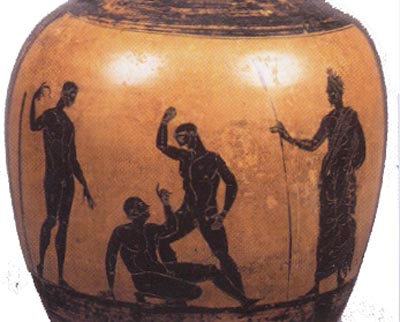
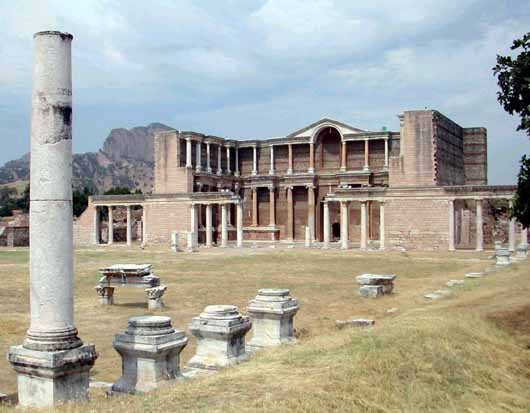
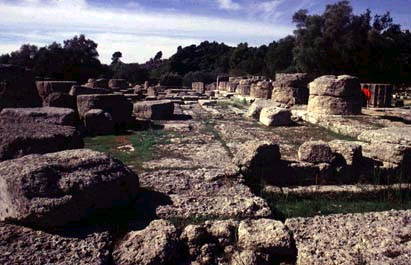
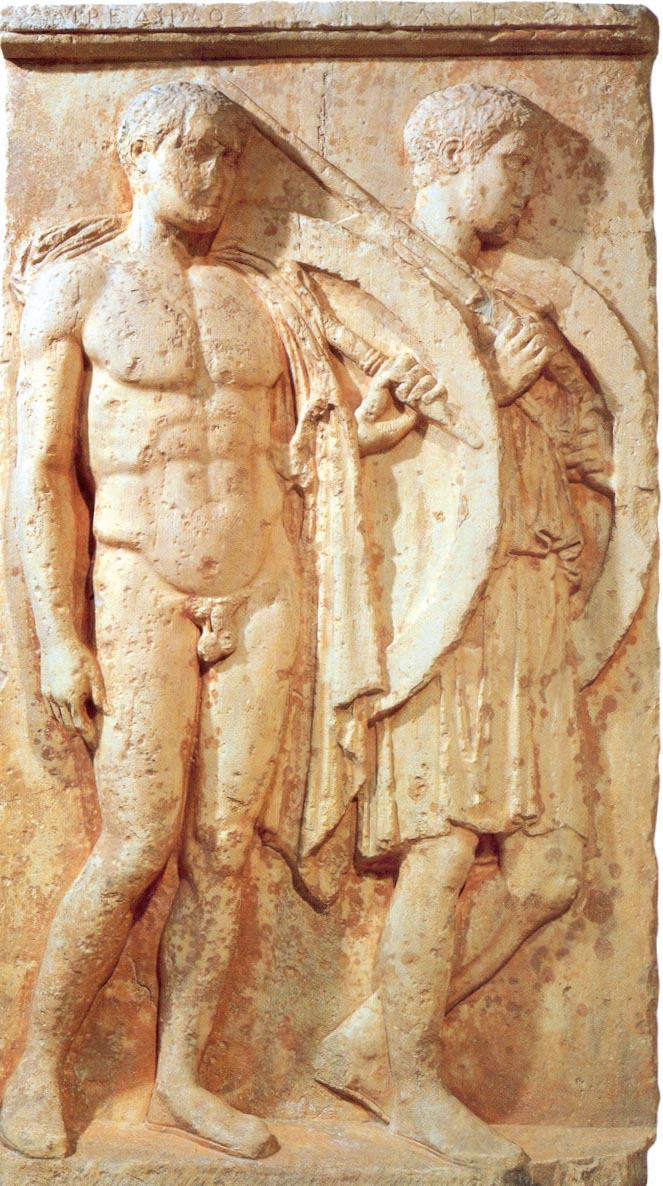
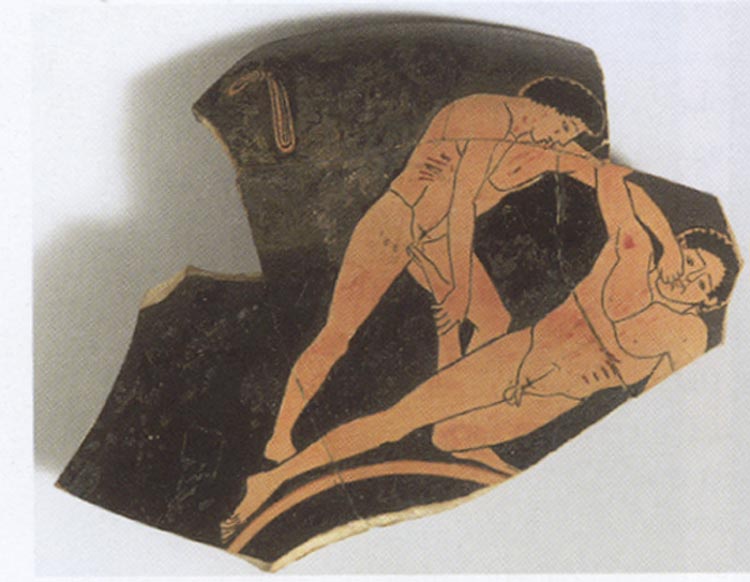
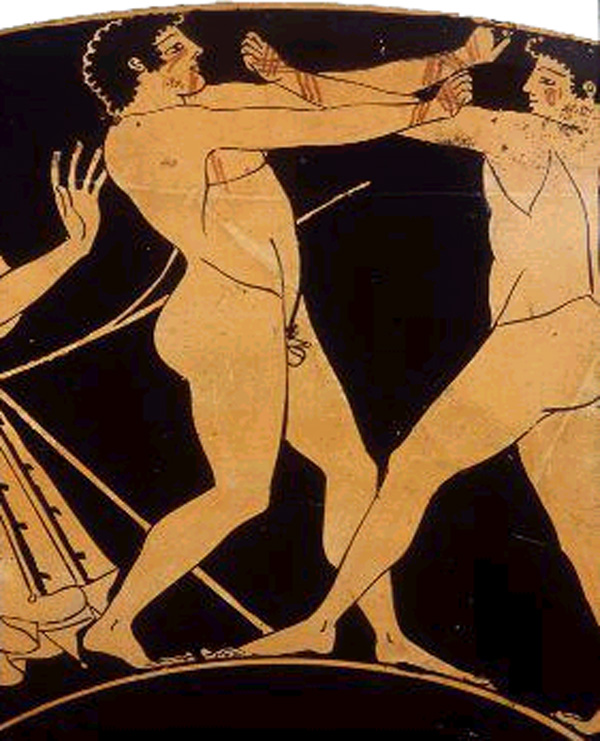
These two paintings represent the physical aspect of the Strife of Valour.
But it must be understood that the Strife of Valour was primarily about Virtue in the moral sense.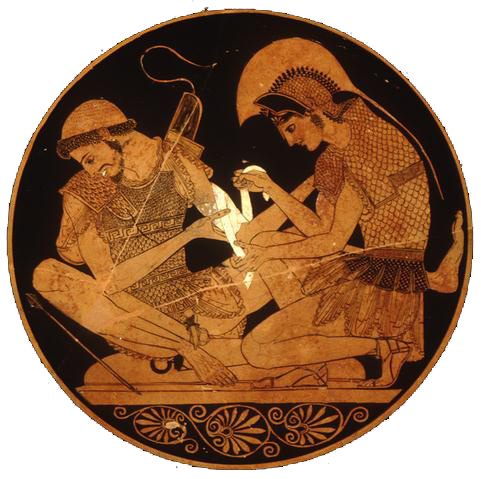
of every action it may be observed that as acted by itself it is neither noble nor base. ... For when the doing of it is noble and right, the thing becomes noble; when wrong, it becomes base. So also it is with [male-male] loving; and Love [Eros] is not in every case noble or worthy of celebration, but only when he impels us to love in a noble manner.
By 'wicked' we mean that vulgar lover, who craves the body rather than the soul; as he is not in love with what abides, he himself is not abiding. As soon as the bloom of the body he so loved begins to fade, he 'flutters off and is gone,' leaving all his speeches and promises dishonoured : whereas the lover of a nature that is worthy, abides throughout life, as being fused into one with the abiding.
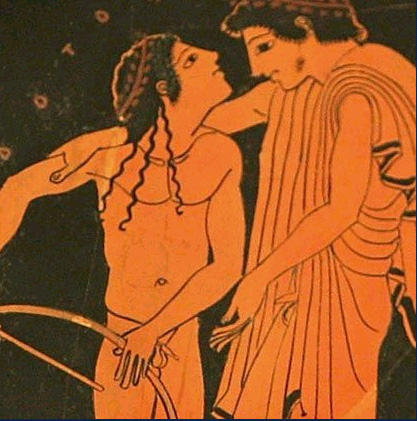
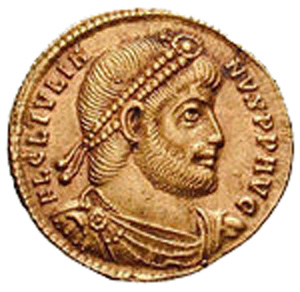
Julian as military leader
Julian as Hellenist
He was killed for his Hellenism
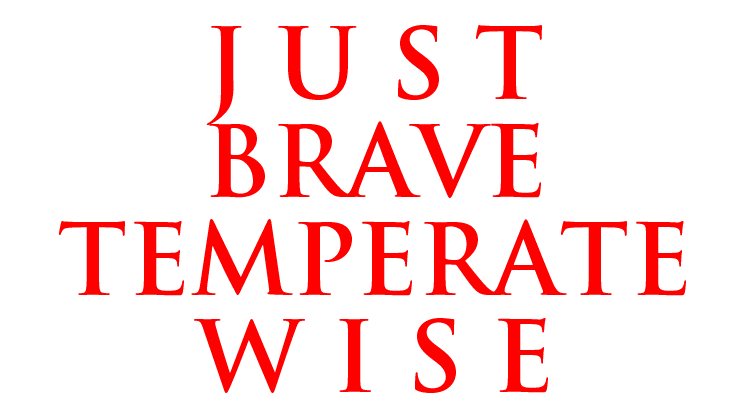
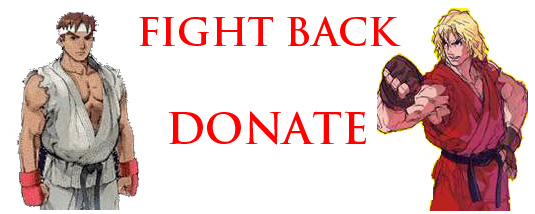


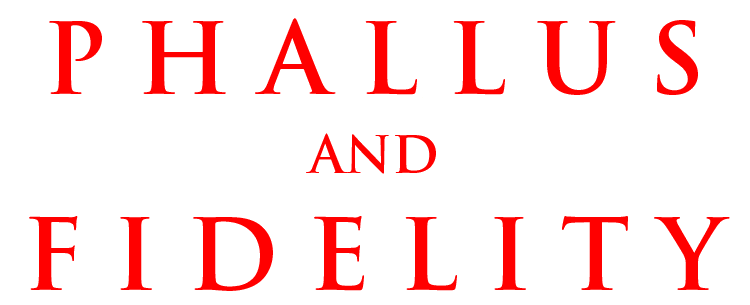



Gay men as victims of nonconsensual sex

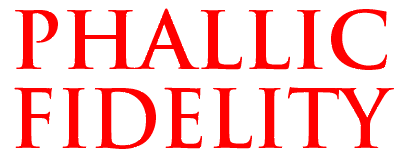

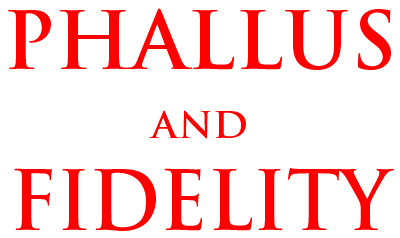
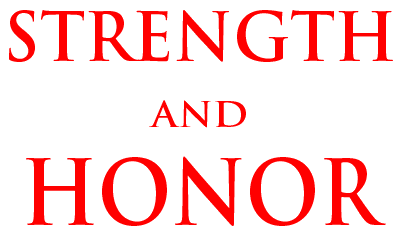
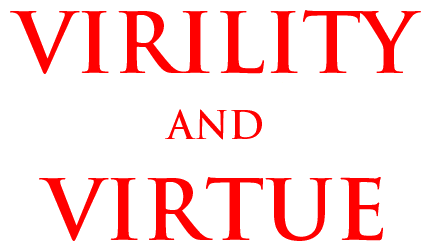
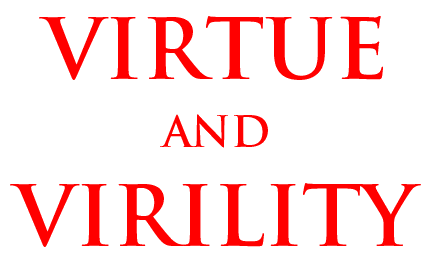
To be frank i don't really like the new Vow of Phallic Fidelity,
this is a sex education/ masculine promotion sit[e] not a cult hahahaha
this is a sex education/ masculine promotion sit[e]
You and Iolaos
A pair of warriors
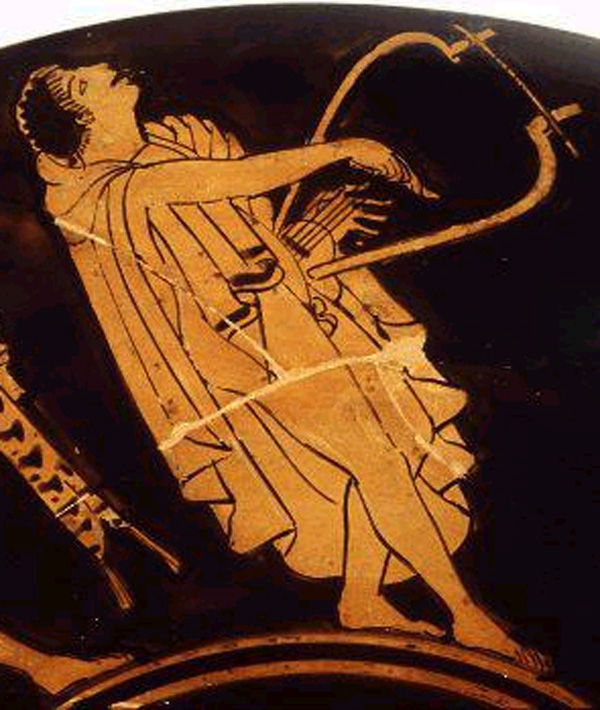
![]()
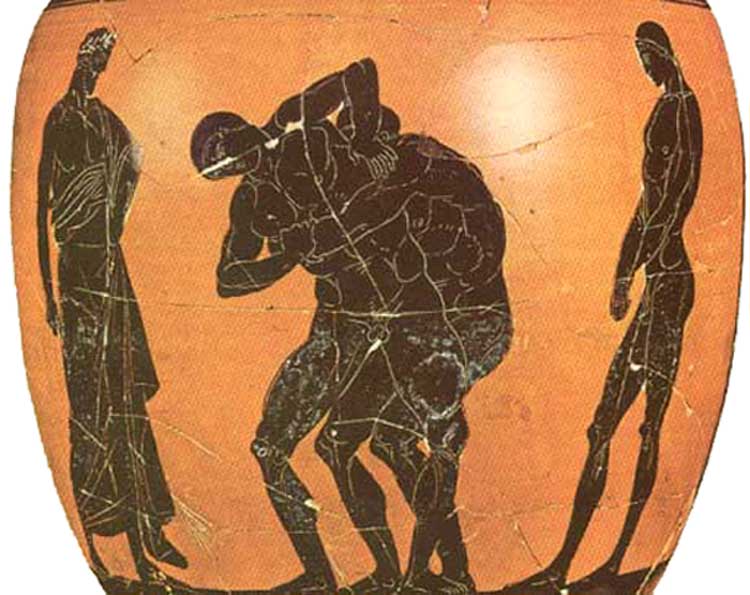
xxxxx
You and Iolaos
A pair of warriors
You and Iolaos
A pair of Spearmen
You and Iolaos
Spearmen both
You and Iolaos
Two Spearmen
And justice is done in open air
The stuff of gallant enterprise
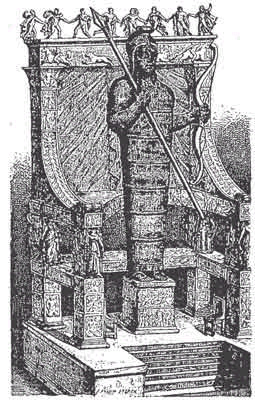
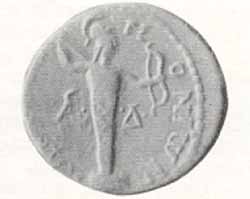

... Here are Dionysus, too, and Herakles; Hermes is bearing the infant Dionysus to heaven, and Athena is taking Herakles to dwell henceforth with the gods. These is also Peleus handing over Achilles to be reared by Cheiron, who is also said to have been his teacher. There is Cephalus, too, carried off by Day because of his beauty. The gods are bringing gifts to the marriage of Harmonia. There is wrought also the single combat of Achilles and Memnon, and Herakles avenging himself upon Diomedes the Thracian, and upon Nessus at the river Euenus. Hermes is bringing the goddesses to Alexander to be judged. Adrastus and Tydeus are staying the fight between Amphiaraus and Lycurgus the son of Pronax. ...

...though [the statue of Apollo] has face, feet, and hands, the rest resembles a bronze pillar. On its head it has a helmet, in its hands a spear and a bow. The pedestal of the statue is fashioned into the shape of an altar; and they say that Hyakinthos is buried in it, and at the Hyakinthia, before the sacrifice to Apollo, they devote offerings to Hyakinthos as to a Hero into this altar through a bronze door, which is to the left of the altar.





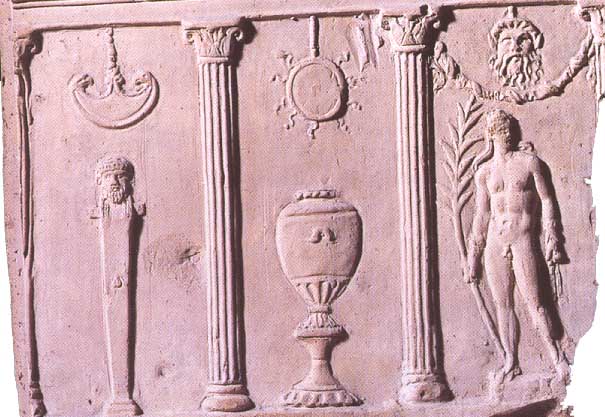
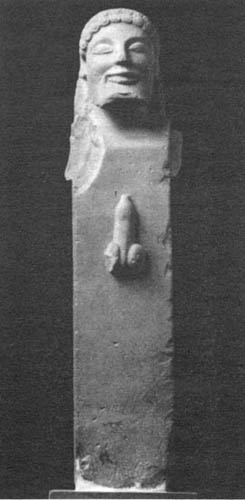
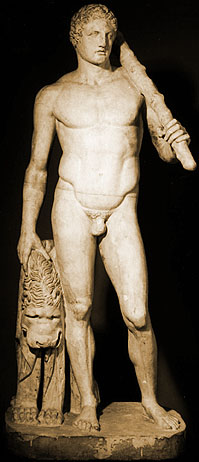
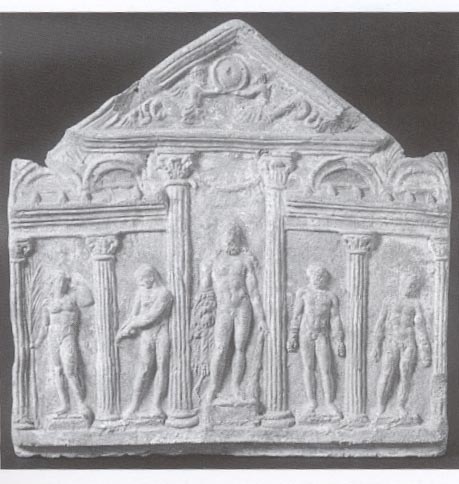
Herakles is in the center,
two boxers on the right,
two other athletes, one a victor, on the left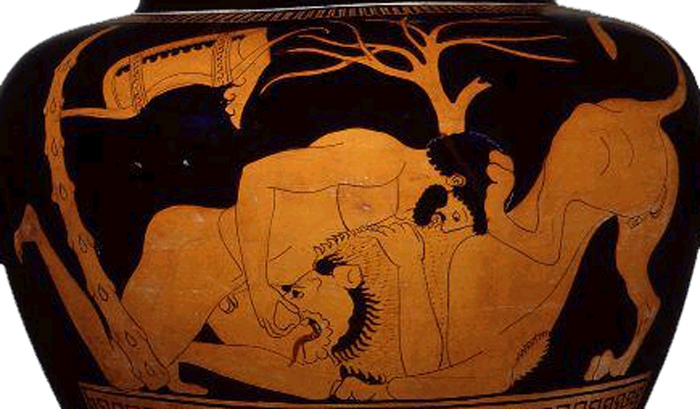
Herakles battles the Nemean lion
Notice how the genitals of both man and beast are prominently displayed
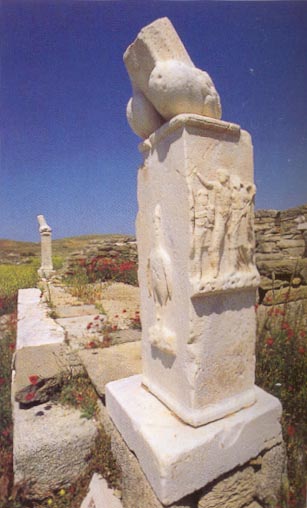
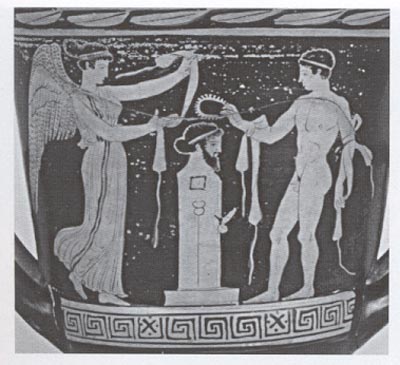
witnesses to [the wrestler's] splendid successes are Iolaos' tomb ...
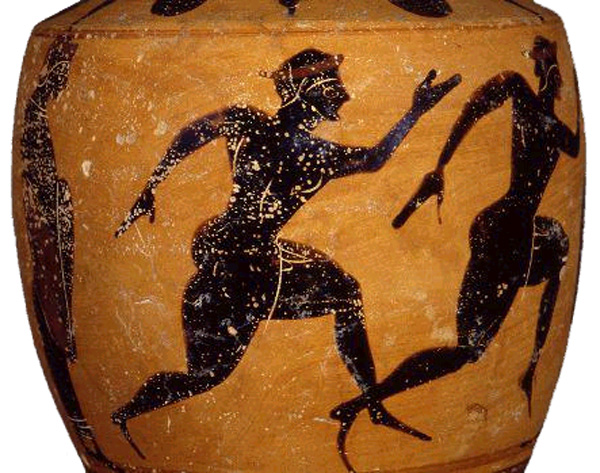
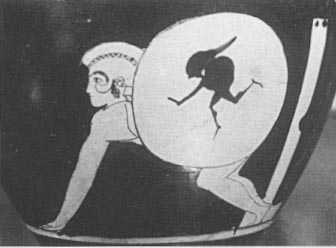
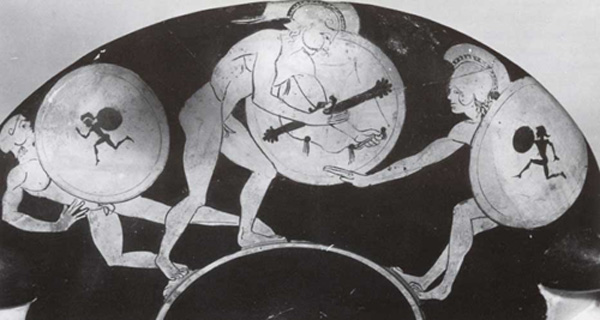
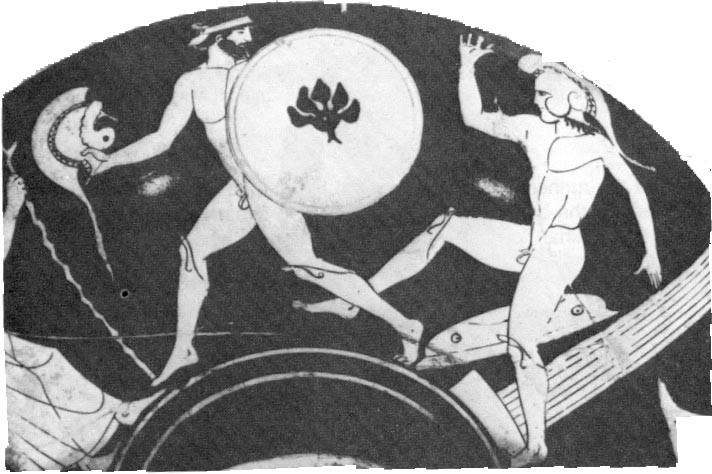
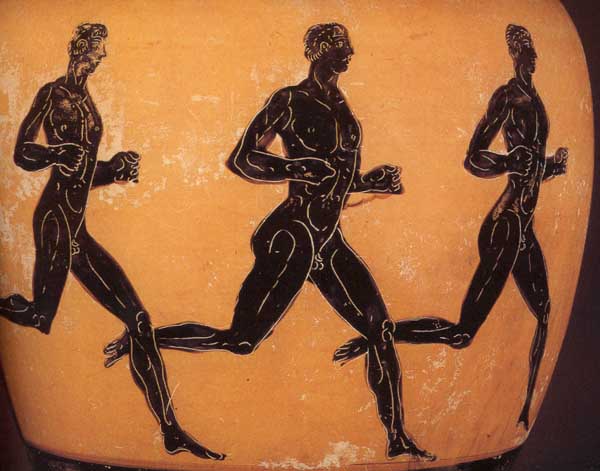

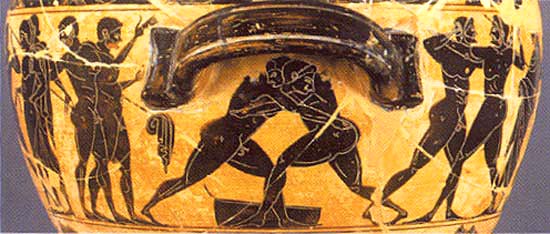
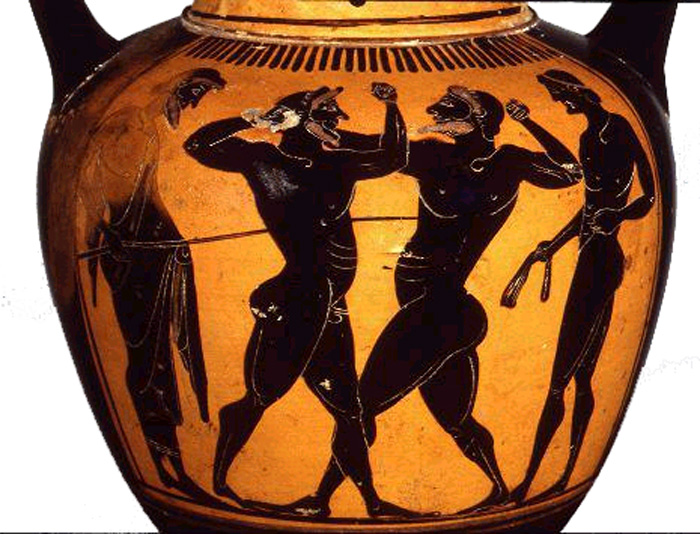
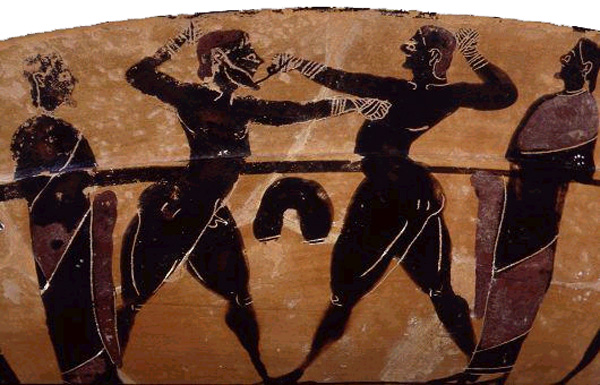
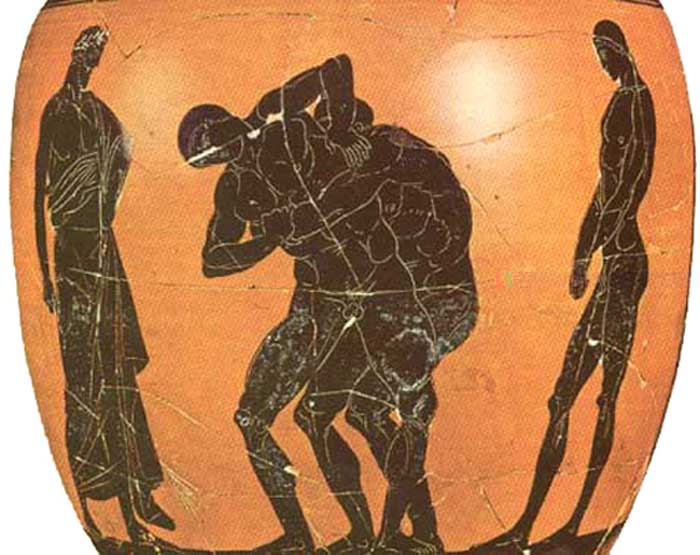
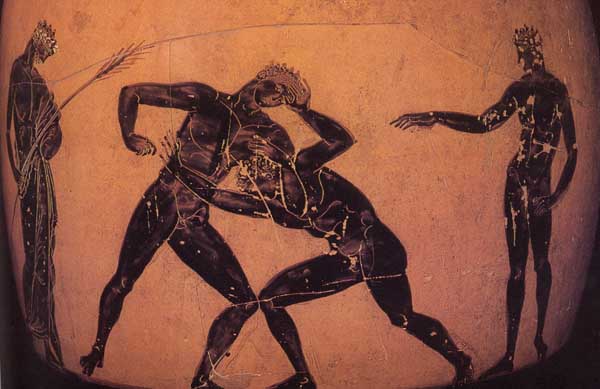
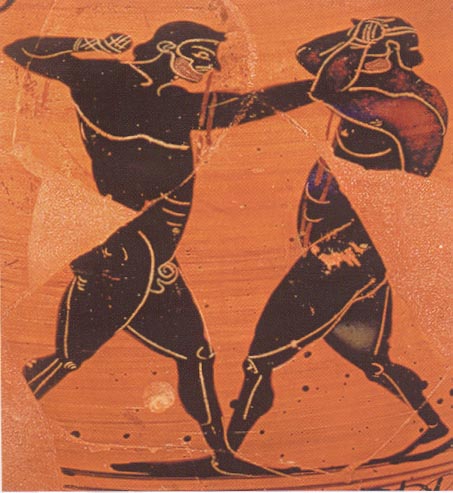

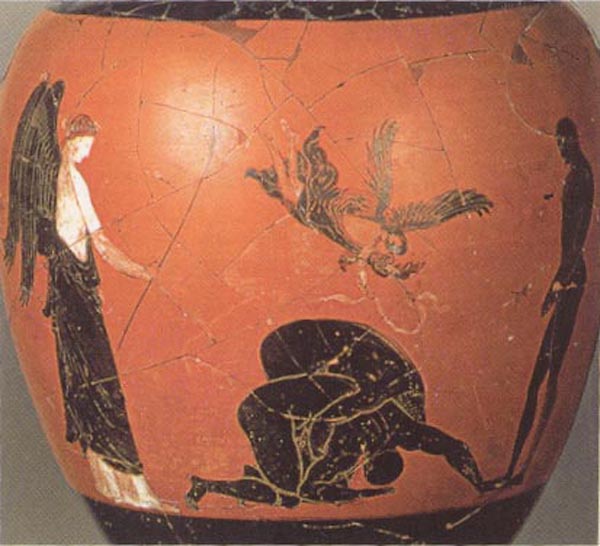
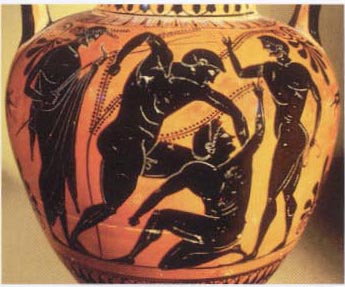

for they were the mightiest charioteers of the heroes,
one born in Lakedaimon [Sparta], the other in Thebes,
adorning their houses with tripods,
cauldrons, and bowls of gold,
whenever they savored the crowns
of victory; and their excellence shines clearly
in the naked foot races and in the races of
armor with clanging shields;
and when they made casts with discuses of stone
(there was no pentathlon, but for each event
a prize was reserved).
They often crowned their hair with thick wreathes from
these events, and appeared beside Dirke's streams [in Thebes]
and close by the Eurotas [in Sparta],
"sown-men," the founding fathers of Thebes],
the other, Tyndareos' son dwelling among the Achaians
on his highland home of Therapna [a town just south of Sparta].
You and Iolaos
A pair of Spearmen
You and Iolaos,
One a spearman, the other a passive homosexual who takes it up the butt.

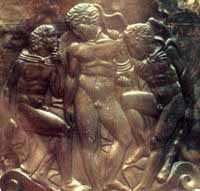
Iolaos, Eros, Herakles
Etruscan, 4th century BC
Iolaos, Eros, Herakles
... a band [such as the Sacred Band of Thebes, consisting of 150 pairs of male lovers,] which is united by the ties of love is truly indissoluble and unbreakable, since both lovers and beloved are ashamed to be disgraced in the presence of the other, and each stands his ground at a moment of danger to protect the other. We need not be surprised at this, since men are more anxious to earn the good opinion of their lovers, even when these are absent, than that of others who are present: there is the case of the man who when his enemy was about to kill him as he lay on the ground, implored the other to run him through the breast, 'so that my beloved may not see me lying dead with a wound in my back and be ashamed of me.'
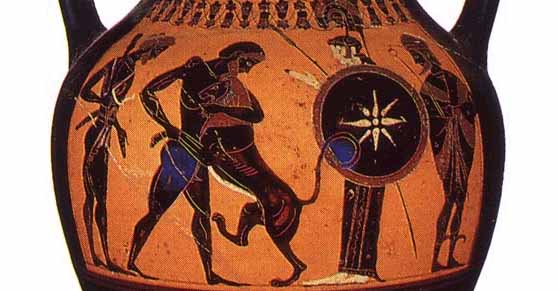
Iolaos helps Herakles kill the Nemean lion
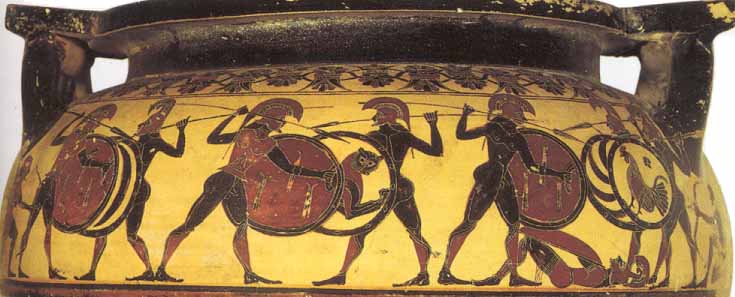
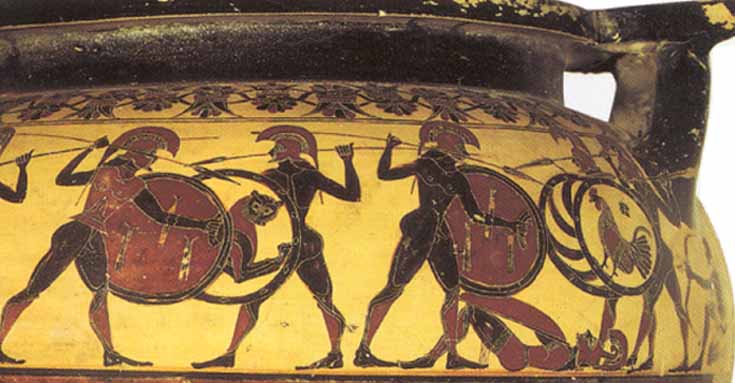
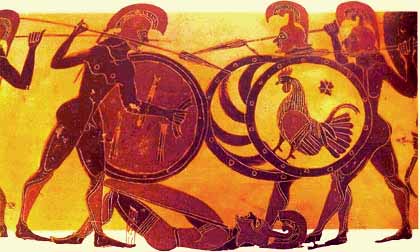
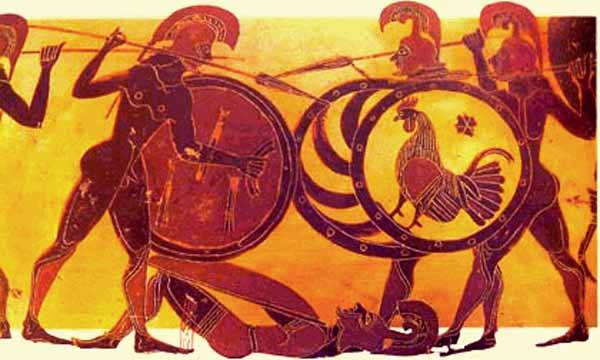
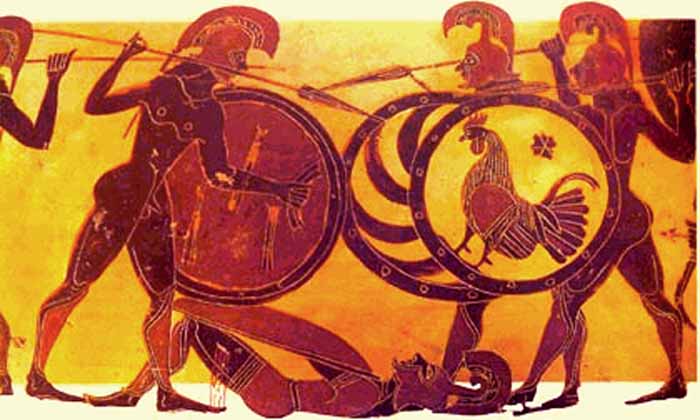

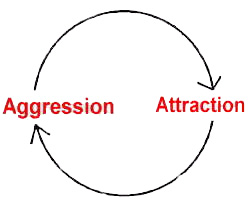
Speaking generally of love between men, it was not, as the poets have reported, the passion of Laius [a Theban king] for the young Chrysippus which set the fashion for this kind of relationship in Thebes. Its origins are rather to be traced to their law-givers, who wished to soften and tone down the hot-tempered and violent element in the Theban character, beginning from earliest boyhood, and for this reason they paid great attention to the flute, both in their education and their recreation.
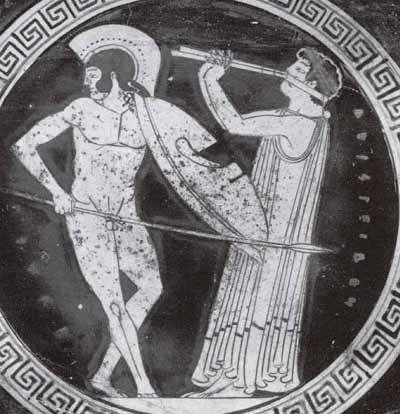
there the counsels of elders
and the young men's spears prevail,
and choruses, the Muse, and Splendor.
They who are a section of the male follow the male, and while they are young, being a piece of the man, they love men and delight in lying down beside and being entwined with men, and they are themselves the best of boys and youths, because they have the most manly nature. ... they are valiant and manly, and have a manly countenance, and they embrace that which is like them. And these when they grow up become our statesmen, and these only, which is a great proof of the truth of what I am saying.
[Men who Love Men ] are themselves the best of boys and youths, because they have the most manly nature. ... they are valiant and manly, and have a manly countenance, and they embrace that which is like them.
It was natural, therefore, that the Band was termed Sacred for the same reason that Plato describes the lover as a friend 'inspired by God'


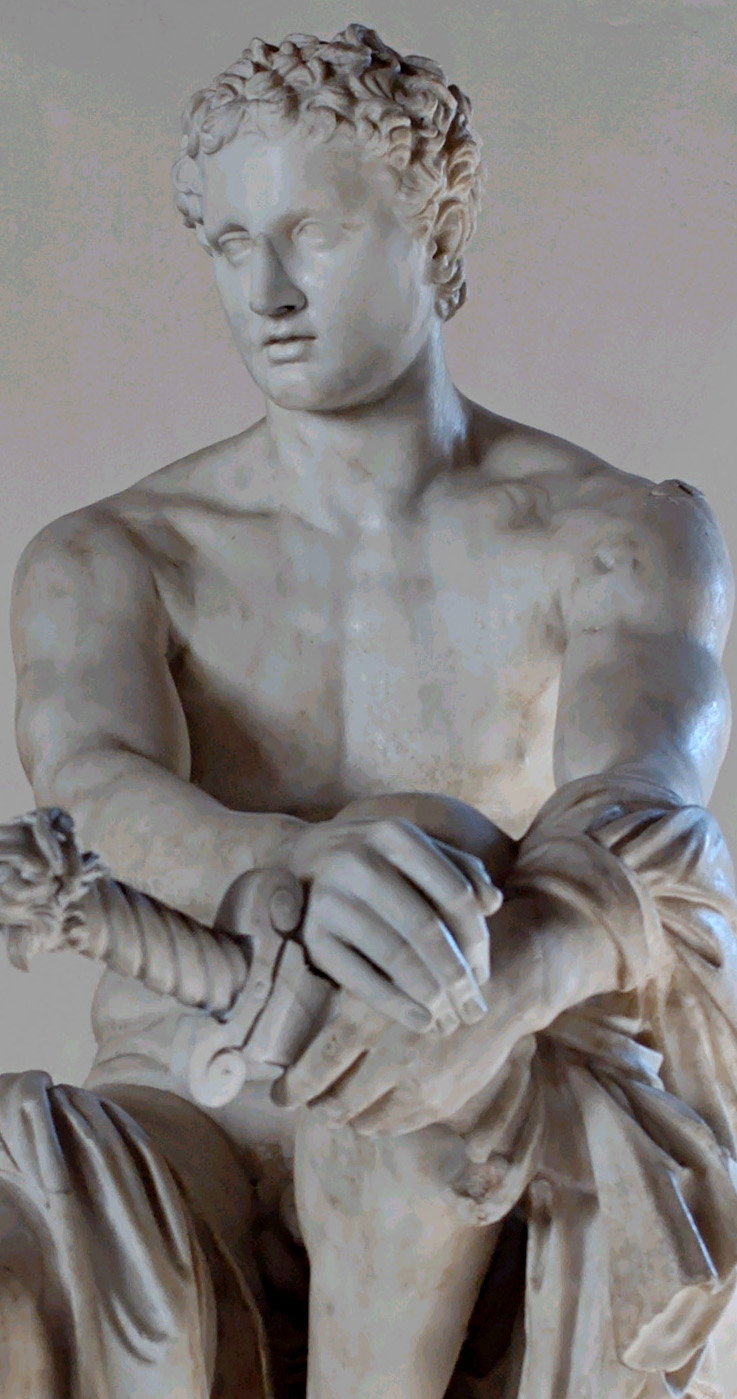



...who would desert his beloved or fail him in the hour of danger? The veriest coward would become a hero, equal to the bravest, at such a time; Love [the God Eros] would inspire him. That courage which, as Homer says, the god breathes into the soul of heroes, Love of himself infuses into the lover.
A system of homosexual pair-bonding kept the normal hoplite bonds at a level of ferocious intensity.
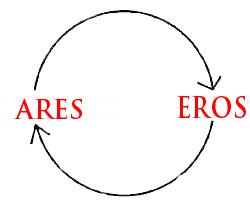

He whose soul is full of the wish to beget looks for something beautiful by which to beget. If he finds a soul which is beautiful, noble, and talented, he greets the whole man, and makes many speeches to him about areté, and the character and pursuits which a good man should have, and he sets about educating him. So in contact and association with him, he begets the offspring he had within himself for so long. Both present and absent, he remembers his partner and shares with him in bringing to perfection that which he begot, so that their parentage is a far stronger link than any share in children begotten of the body, and their love is more lasting than that of marriage, because they share in more beautiful and more immortal children.
Poetry and philosophy, although he believes their conceptions of reality are widely and deeply separated, are united by the ideal of paideia [culture achieved through that true education which is the molding of Men], which springs from Eros, the love for areté.
Plato regards the spiritual history of Greece from Homer and Lycurgus down to himself as a single unity.
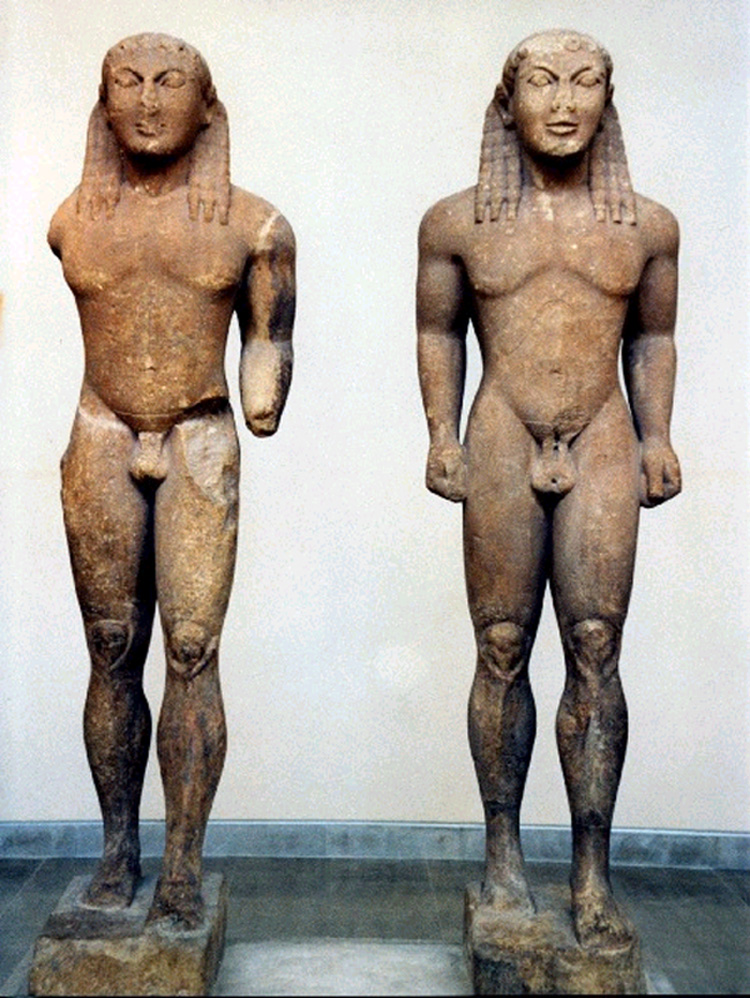
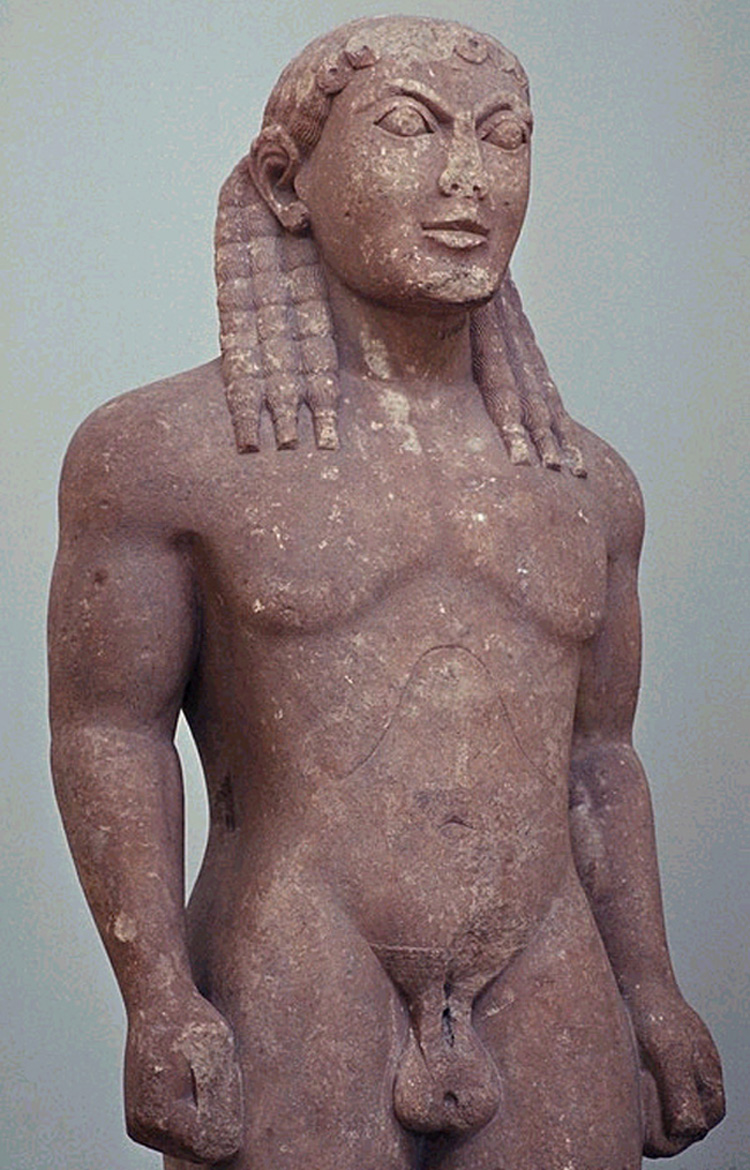
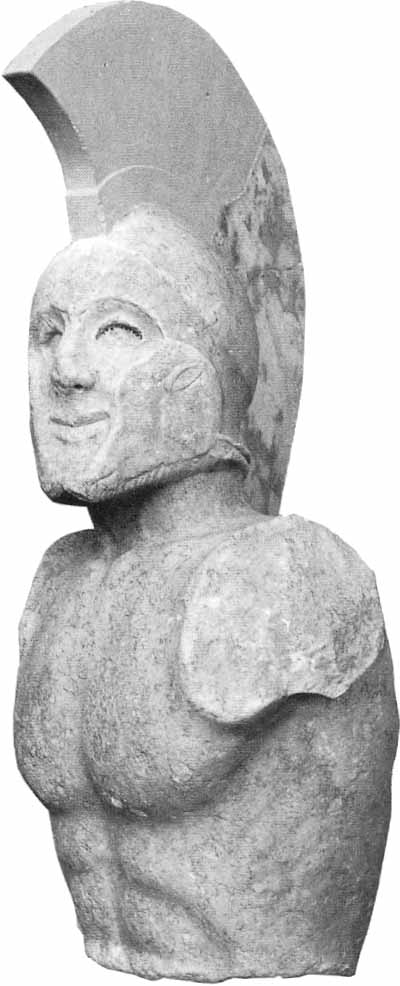


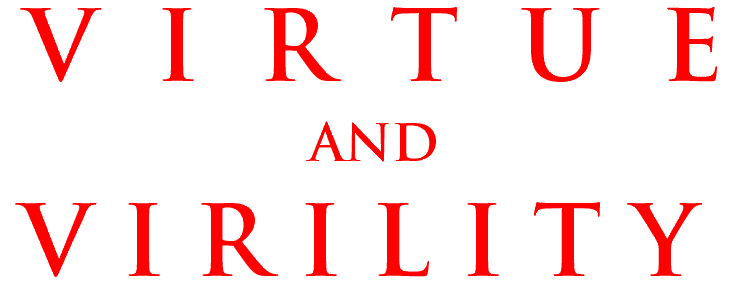


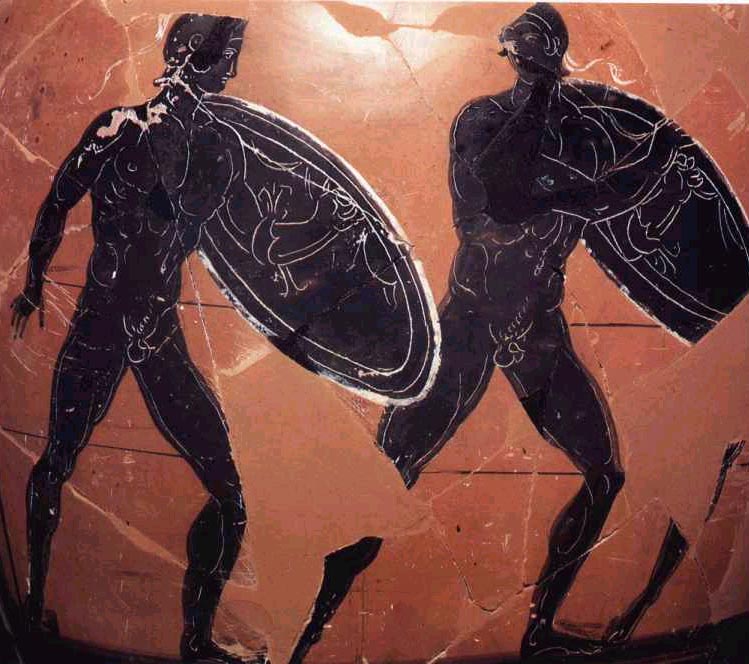
Aristides was a close friend of Cleisthenes, who established the Athenian constitution after the expulsion of the tyrants, but the man whom he admired and took as his model above all other statesmen was Lycurgus the
Spartan.
Of all Aristides' virtues, it was his justice which most impressed itself on the masses, since it was this which he practised most consistently and which affected most people. For this reason, although he was poor and had no standing but that of a popular leader, he won the most royal and god-like title of The Just. This is an epithet which was never sought after by kings or tyrants; some of them delighted in being styled The Beseiger of Cities, The Thunderbolt, or The Conqueror, and others The Eagle or The Hawk, but all of them, apparently, preferred a reknown which was founded on power or violence rather than on virtue.
[M]en long for immortality, to which no flesh can attain, and for power, which remains for the most part in the hands of fortune, while they give virtue, the only excellence of which we are capable, the last place in their scheme of values. But here they show themselves fools, since a life that is spent in the midst of power and great fortune and authority still needs justice to make it divine, for injustice renders it merely brutish.
They give virtue, the only excellence of which we are capable, the last place in their scheme of values.
They give virtue, the only excellence of which we are capable, the last place in their scheme of values.
These Lakonikan Loves hav[e] nothing shameful in them, but being attended rather with great modesty, high ambition, and an ardent desire for excellence, as I have written in my life of Lycurgus.


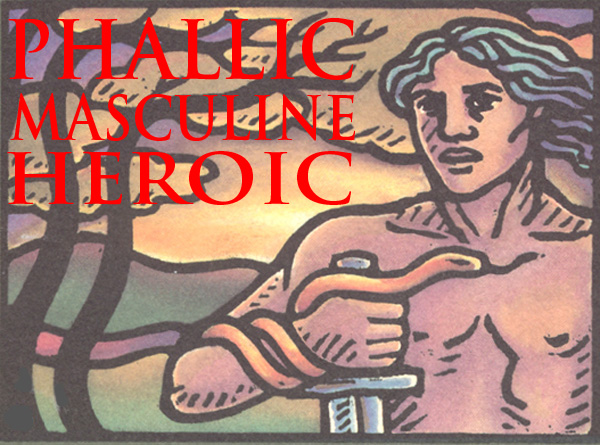






| Heroes Site Guide | Toward a New Concept of M2M | What Sex Is |In Search of an Heroic Friend | Masculinity and Spirit |
| Jocks and Cocks |
Gilgamesh | The Greeks | Hoplites! | The Warrior Bond | Nude Combat | Phallic, Masculine, Heroic | Reading |
| Heroic Homosex Home | Cockrub Warriors Home | Heroes Home | Story of Bill and Brett Home | Frot Club Home |
| Definitions | FAQs | Join Us | Contact Us | Tell Your Story |



